4 Volumes
Constitutional Era
American history between the Revolution and the approach of the Civil War, was dominated by the Constitutional Convention in Philadelphia in 1787. Background rumbling was from the French Revolution. The War of 1812 was merely an embarrassment.
Sociology: Philadelphia and the Quaker Colonies
The early Philadelphia had many faces, its people were varied and interesting; its history turbulent and of lasting importance.
Great 1929 Depression and World War Two
The Treaty of Versailles probably caused World War II, making WW II just a continuation of WW I.
Revisionist Themes
In taking a comprehensive view of a city, an author sometimes makes observations which differ from the common view. Usually with special pride, sometimes a little sullen.
Constitution-tampering is Unwise
.
What Do Unions Want?
.
Looking Beyond Cheap Oil
It can't hurt if we stop global warming, and probably, in the long run, it will matter more than whether the Jews defeat the Arabs, or vice-versa. However, we won't think so if one or the other blows us up. Timing the sequence means it may be important to settle the terrorist issue, sooner.
Rising (China and) Developing Nations
.
Philadelphia City-County Consolidation of 1854
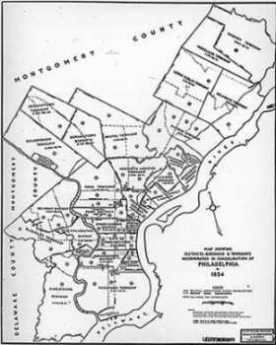
|
| Consolidation Map 1854 |
Philadelphia is still referred to as a city of neighborhoods. Prior to 1854, most of those neighborhoods were towns, boroughs, and townships, until the Act of City-County Consolidation merged them all into a countywide city. It was a time of tumultuous growth, with the city population growing from 120,000 to over 500,000 between the 1850 and 1860 census. There can be little doubt that disorderly growth was disruptive for both local loyalties and the ability of the small jurisdictions to cope with their problems, making consolidation politically much more achievable. A century later, there were still two hundred farms left in the county which was otherwise completely urbanized and industrialized. For seventy-five years, Philadelphia had the only major urban Republican political machine. By 1900 (and by using some carefully chosen definitions) it was possible to claim that Philadelphia was the richest city in the world, although this dizzy growth came to an abrupt end with the 1929 stock market crash, and the population of Philadelphia now shrinks every year. In answering the question of whether consolidation with the suburbs was a good thing or a bad thing, it was clearly a good thing. But since Philadelphia is suffering from decline, it becomes legitimate to ask whether its political boundaries might now be too large.
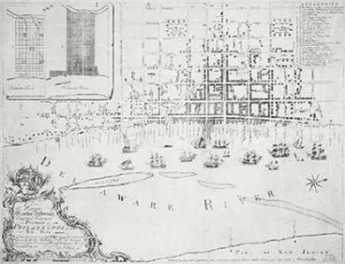
|
| Philadelphia Map 1762 |
The possible legitimacy of this suggestion is easily demonstrated by a train trip from New York to Washington. The borders of the city on both the north and the south are quickly noticed out the train window, as the place where prosperity ends and slums abruptly begin. In 1854 it was just the other way around, just as is still the case in many European cities like Paris and Madrid. But as the train gets closer to the station in the center of the city, it can also be noticed that the slums of the decaying city do not spread out from a rotten core. Center City reappears as a shining city on a hill, surrounded by a wide band of decay. The dynamic thrusting city once grew out to its political border, and then when population shrank, left a wide ring of abandonment. It had outgrown its blood supply. Prohibitively high gasoline taxes in Europe inhibit the American phenomenon of commuter suburbs. The economic advantage of cheap land overcomes the cost of building high-rise apartments upward, but there is some level of gasoline taxation which overcomes that advantage. Without meaning to impute duplicitous motives to anyone, it really is another legitimate question whether some current "green" environmental concerns might have some urban-suburban real estate competition mixed with concern about global warming. Let's skip hurriedly past that inflammatory observation, however, because the thought before us is not whether to manipulate gas taxes, but whether it might be useful to help post-industrial cities by contracting their political borders.
Before reaching that conclusion, however, it seems worthwhile to clarify the post-industrial concept. America certainly does have a rust belt of dying cities once centered on "heavy" industry which has now largely migrated abroad to underdeveloped nations. But while it is true that our national balance of trade shows weakness trying to export as much as we import, it is not true at all that we manufacture less than we once did. Rather, manufacturing productivity has increased so substantially that we actually manufacture more goods, but we do it with less manpower and less pollution, too. The productivity revolution is even more advanced in agriculture, which once was the main activity of everyone, but now employs less than 2% of the working population. This is not a quibble or a digression; it is mentioned in order to forestall any idea that cities would resume outward physical growth if only we could manipulate tariffs or monetary exchange rates or elect more protectionist politicians to Congress. Projecting demographics and economics into the far future, the physical diameters of most American cities are unlikely to widen, more likely to shrink. If other cities repeat the Philadelphia pattern, the vacant land for easy exploitation lies in the ruined band of property within the present political boundaries of cities, or if you please, between the prosperous urban center and the prosperous suburban ring.
Many American cities with populations of about 500,000 do need more room to grow, so let them do it just as Philadelphia did a century ago, by annexing suburbs. But there are other cities which have lost at least 500,000 population and thus have available low-cost low-tax land which would mostly enhance the neighborhood if existing structures were leveled to the ground. Curiously, both the shrunken urban core and the bumptious thriving suburbs could compete better for redeveloping this urban desert if the obstacles, mostly political and emotional, of the political boundary, could be more easily modified. But that's also just a political problem, and not necessarily an unsolvable one.
Second Mortgages Want to Be First

|
| Chrysler Logo |
In a bankruptcy proceeding, there has long been a traditional conflict between the holders of first mortgages and the holders of second mortgages. It goes like this: since the holder of a first mortgage gets paid first, his incentive is to hurry up the process and get the money. The holder of a second mortgage, however, only gets paid what is left, so this party will normally wish to stall proceedings in the hope the market will improve and give the second mortgage a better payout. Normally, this sort of predictable dispute is covered by contracts, and in any event, most banks hold both kinds of mortgages and are neutral about what is just and fair. In the current banking crisis, however, the major banks have developed an incentive to favor the second mortgage, so they have a new view of what is just and fair. Four of the largest banks hold a total of $440 billion of second mortgages but have very few first mortgages because they were sold off in the securitization process. The banks mostly retained the function of servicing first mortgages, however, so they now have quite a conflict of interest.
Something like this seems to be going on with the resolution of the Detroit auto makers, with the difference that politicians tend to favor the interest of the auto workers in the bankruptcies because there are more voters to be influenced. And in the case of the auto companies, there are stockholders who will be wiped out by a bankruptcy unless the liquidation of the company assets produces enough cash to satisfy the creditors, secured and unsecured. After all, stockholders aren't creditors at all; they are owners of the company. No matter how things turn out, however, the secured creditors would normally have the first call on whatever is salvaged. So, it's one class of secured creditor against another, or else it is the secured creditors against the "stakeholders", employees or any other unsecured creditor. If the government intervenes, there is the additional issue of the Fifth Amendment of the Constitution, which prohibits the government from the "taking" of private property without just compensation. Representative Conyers of Michigan, whose political allegiance is not in doubt, has introduced legislation to prohibit lawsuits in these matters. So now, the prospect grows of a constitutional clash between Congress and the Supreme Court, over the Constitutionality of such a law which denies due process. So that gets us into the fourteenth amendment, too. If we look beyond the technicalities, the looming clash is between President Obama and Chief Justice Roberts. One of them wants to take money from secured creditors and make it available to someone with more political clout; and the other surely wants to preserve the sanctity of contracts, the rights of property holders, due process, and the right of the Supreme Court to declare contrary laws to be unconstitutional.
Unless someone backs off, the situation would seem to be as monumental as Franklin Roosevelt's Supreme Court-packing proposal. Because -- there is every reason to anticipate a 5-4 vote by the Supreme Court, a 5-3 vote if Justice Souter is not replaced by that time, and strenuous efforts to alter the balance.
Special Education, Special Problems

|
| School Bus |
President John Kennedy's sister was mentally retarded; he is given credit for immense transformation of American attitudes about the topic. Until his presidency, mental retardation was viewed as a shame to be hidden, kept in the closet. Institutions to house them were underfunded and located in far remote corners of a state. Out of mind. And while it goes too far to say there is no shame and no underfunding today, we have gone a long way, with new laws forcing states to treat these citizens with more official respect, and new social attitudes to treat them with more actual respect. We may not have reached perfection, but we have gone as fast as any nation could be reasonably expected to go.
However, any social revolution has unintended consequences; this one has big ones, surfacing unexpectedly in the public school system. For example, the king-hating founding fathers were very resistant to top-down government, so federal powers were strongly limited. So, although John Kennedy can be admired for leadership, the federal government which he controlled only contributes about 6% of the cost of what it has ordered the schools to do, and the rest of the cost is divided roughly equally between state and municipal governments. As the cost steadily grows, special education has become a poster child for "unfunded mandates", increasingly annoying to the governments who did not participate in the original decision. We seem to be waking up to this dilemma just at a time when the federal government is encountering strong resistance to further spending of any sort. The states and municipal governments have always been forced to live within their annual budgets, unable to print money, hence unable to borrow without limit. As Robert Rubin said to Bill Clinton when he proposed some massive spending, "The bond market won't let you."
The cost of bringing mentally handicapped individuals back into the community is steadily growing, in the face of a dawning recognition that we are talking about 8% of the population. Take a random twelve school children, and one of them will be mentally handicapped to the point where future employability is in question; that's what 8% means. Since they are handicapped, they consume 13% of the average school budget and growing. The degree of impairment varies, with the worst cases really representing medical problems rather than educational ones. Small wonder there is friction between the Departments of Education and the Medicaid Programs, multiplying by two the frictions between federal, state and municipal governments into six little civil wars, times fifty. An occasional case is so severe that its extreme costs are able to upset a small school budget entirely by itself, tending to convert the poor subject into a political hot potato, regularly described by everybody as someone else's responsibility. There are 9 million of these individuals in public schools, 90,000 in private schools. They consume as much as 20% of some public school district budgets.
All taxes, especially new ones, are bitterly resisted in a recession. Unfortunately, the school budgets are put under pressure everywhere by a growing recognition that our economic survival in a globalized economy depends on getting nearly everybody into college. Nearly everybody wants more education money to be devoted to the college-bound children at a time when there is less of it; devoting 13% of that strained budget to children with limited prospects of even supporting themselves, comes as a shock. Recognizing these facts, the parents of such handicapped children redouble their frenzy to do for them what they can, while the parents are still alive to do it. It's a tough situation because a simultaneous focus on specialized treatment for both the gifted and the handicapped is irreconcilably in conflict with the goal of integrating the two into a diverse and harmonious school community, with equal justice to all.
As school budgets thus get increasingly close scrutiny by anxious taxpayers, handicapped children come under pressure from a different direction. It seems to be a national fact that slightly more than half of the employees of almost any school system are non-teaching staff. Without any further detail, most parents anxious about college preparation are tempted to conclude that teaching is the only thing schools are meant to do. And a few parents who are trained in management will voice the adage that "when you cut, the first place to cut is ADMIN." Since educating mentally handicapped children requires more staff who are not exactly academic teachers, this is one place the two competing parent aspirations come to the surface.
Unfortunately, the larger problem is worse than that. When the valedictorian graduates, the hometown municipal government is rid of his costs. But when a handicapped person gets as far in the school system as abilities will permit, there is still a potential of state dependence for the rest of a very long life. The child inevitably outlives the parents, the full costs finally emerge. We have dismantled the state homes for the handicapped, integrating the handicapped into the community. But when the parents are gone, we see how little help the community is really prepared or able, to give.
Taking Risks Demands Its Price

|
| downturn |
Someday, books will be written about who discovered what, and sold what, to make S & P futures suddenly go up and down 300 points in ten minutes on August 17, 2007, soon followed by violent volatility in many other markets. Confusion reigned for a few days, but within a week there was general agreement about the difficulty: the "spread" of interest rates between risky loans and very safe ones had been too narrow for months, and was reverting back to normal. Risk had been mispriced; a risky loan was just as risky as it ever was, as everyone should have realized. If the risky borrower was unwilling to pay higher interest rates, why would any lender bother with him? Since this had been obvious all along, why had lenders temporarily believed otherwise, charging rates scarcely higher for dodgy loans than for well-secured ones?

|
| Alan Greenspan |
Alan Greenspan (in 1996) had called this question a conundrum, but it's getting easier to understand. The emergence of prosperity in one decade among 200 million impoverished Chinese had resulted in wealth which found its way into international markets, much like a gold rush or the discovery of oil. Sudden huge wealth often cannot be easily assimilated, hence was available to loan at cheaper rates. The globalization of world finance has vastly improved the speed of markets to absorb money gluts, but in this case, had the unfortunate effect of spreading it out into less sophisticated corners of the world economy. It particularly affected residential mortgages, which proved to be the weakest link in the chain of lending and borrowing. Ten years of low-interest rates pushed up the prices of existing homes, tempting builders to overcharge for new construction, and inexperienced buyers to pay those inflated prices with cheap mortgages. Between them, Congress and the banks had devised ways to exploit this situation, making the collapse worse when it came. The interest on home mortgages was preferentially tax deductible, so it became the favorite way to borrow. Banks made it easier to refinance at a lower rate as the spread gradually narrowed. To make it even easier, reverse mortgages converted home ownership into an ATM machine with tax deductibility. Because home prices were steadily rising, banks were willing to reduce down payments, on the assumption that home equity would soon rise to represent the amount formerly required as a down payment. As it would have, perhaps, if homeowners had not promptly drained it out the back door of reverse mortgages. Second homes became a cheaper way to have a vacation; steadily rising prices encouraged outright speculation, called flipping. Congress reinsured mortgages, eventually most of them, through FNMA, and then pressured Fannie Mae to insist on spreading the joys of home ownership to people who could not afford the no-down-payment houses they were romanced into buying. Investment banks offered to buy the mortgages from the local originating banks in order to package them into securitized bundles, which thus deprived the originating banks of any incentive to reject eager buyers, no matter how dubious their credit standing. What is more, this process provided a conduit for spreading bad credit risk into the equity markets, including the equity of the banking system itself, and creating the temptation for hedge funds to start runs on the banks in novel forms. There once was a time when customers lined up at the back door to make withdrawals in a bank run. Since investment banks obtain their deposits by borrowing wholesale, they simplified the process of starting a bank run when the speculative process reversed. Which it did on August 17, 2007, possibly not spontaneously, but certainly inevitably.
Home mortgages were once loans for thirty years; even now, they extend for many years. Homeowners stay in one house for an average of seven years. For legal reasons going back two hundred years, they are non-recourse loans, meaning the house alone is at risk to the mortgage lender, who may normally not pursue the homeowner for assets other than the foreclosure, even if the other assets are considerable. In a housing bubble, this creates a special hazard for lenders during the inevitable decline of house prices back to normal. As house prices fall, as they should and will, many homeowners will find it is cheaper to walk away from a foreclosure than to pay off the mortgage. It has been calculated that potentially as many as 50% of mortgages might eventually find themselves in this squeeze. The situation differs from a car loan, for example. Every new car is worth 20% less than the sale price, immediately after the sale. But this does not tempt car buyers to walk away from their loan, because the car loan is a recourse loan. The uncomfortable prospect is that financial reverses alone might not be the reason homeowners submit to foreclosure. If this particular antisocial behavior loses its stigma, a very large proportion of mortgages could be foreclosed on owners who are perfectly able to pay them off.
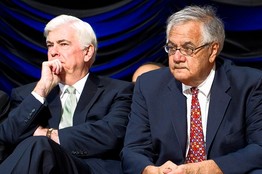
|
| Barney Frank and Chris Dodd |
For all these reasons, house prices are the main bubble in an economy overstimulated by cheap money, and mortgage financing is at the root of a banking crisis. The banking system itself is precarious because it too responded to the temptation of abundant credit at abnormally low-interest rates. The process took the form of over-leveraging in order to magnify profits in a competitive market. Greed was not the only motivation; corporate raiders in the form of Private Equity could swoop down on any company unwise enough to accumulate internal cash. The new owner would then substitute debt for cash, and the prudent company (under new management, of course) was no better off than if it had itself over-leveraged. The Federal Reserve limits commercial banks to loaning thirteen times their stockholder equity, but investment banks had the foolhardiness to borrow thirty times equity. A decline of only three percent in the value of their loans wipes them out. The Federal Reserve Bank of New York, by the way, is leveraged at over a hundred times its equity. The Fed can print money to pay its debts, of course, but the result is a falling value of the dollar in international exchange and ultimately, world inflation. No one predicts the half-way point in this decline to be sooner than two years, which means a recession lasting at least four years. The first two efforts of public officials to halt the decline, the purchase of toxic debt and direct lending to banks, have been abandoned as failures, and the Barney Frank/ Chris Dodd offer for Congress to repurchase mortgages was simply pathetic, with only two hundred responses when over two million were anticipated. If the public loses faith in the ability of the government to do anything about the matter, prices can be expected to overshoot on the downside, not just return to normal. House prices do need to decline, but slowly enough to avoid a panic. And American banks and businesses need to reduce the extent of their borrowing, but without measures which impair the ability of new businesses to make loans, or the ability of shaky businesses like the Detroit auto industry, to survive.
In closing, a word is needed to explain why the foreclosure of $100 billion of California and Florida bungalows should threaten a collapse in the trillions. Economists have fallen into the habit of equating interest rates with risk; the more risk, the higher the interest rates become. That's true, but the risk is not the only factor affecting interest rates. Since they are essentially the rent paid for the use of someone else's money, interest rates respond to the supply of money interest rates, just as supply and demand of rental housing affect rents. The flood of liquidity from developing countries into the world economy pushed interest rates down, but somehow that was taken to imply that risk had decreased. When interest rates go up again, for whatever reason, the money will effectively evaporate. The best example of this relationship is in the bond market. When interest rates go up, the principal value of existing bonds declines. With interest rates of 5% as an example, bond prices go up and down twenty times as much as the interest rate, but in the opposite direction. To repeat: when general interest rates rise, money in the economy disappears about twenty times as fast. That's a succinct description of what started to happen, when the prevailing risk premium returned to its normal higher level, on August 17, 2007.
George Washington Demands a Better Constitution
GEORGE Washington was a far more complex person than most people suppose, and he wanted it that way. He was born to be a tall imposing athlete, eventually a bold and dashing soldier. On top of that framework, he carefully constructed a public image of himself as aloof, selfless, inflexibly committed to keeping his word. Parson Weems the biographer may have overdone the image a little, but Washington gave Weems plenty to work with and undoubtedly would have enjoyed overhearing the stories of the cherry tree and tossing the coin across an impossibly wide Potomac. Washington had a bad temper and could remember a grievance for life. He married up, to the richest woman in Virginia.

|
| Potomac River |
Growing up along the wide Potomac River, Washington early conceived a life-long ambition to convert the Potomac into America's main highway to the Mississippi. He did indeed live to watch the nation's new capital start to move into the Potomac swamps across from his Mount Vernon mansion, in a city named for him. For now, retiring from military command with great fanfare and farewells after the Revolution, he returned to private life on this Virginia farm. He made an important political mistake along this path, by vowing in public never to return to public life. During the years after the Revolution but before the new Constitution, his attention quickly returned to building canals along the Potomac River, deepening it for transportation, and connecting its headwaters over a portage in Pennsylvania to the headwaters of the Monongahela River -- hence to the Ohio, then the Mississippi, or up the Allegheny River to the Great Lakes. He personally owned 40,000 acres along this river path to the center of North America. The occasion for a national constitutional convention grew out of a meeting with Maryland to reach an agreement about this Potomac vision, which was being blocked by commercial interests in Baltimore. Ultimately, Baltimore won the commercial race; so it was the Baltimore and Ohio Railroad which captured the early commerce to the west. Washington also made deals, ultimately to Baltimore's benefit, with the James River interests, to give them a share of the development of the Chesapeake Bay trade. As a young man, George Washington had acted as a surveyor for most of this region, and as a young soldier had explored the Indian trade to Pittsburgh, actually starting the French and Indian War during this trip. He was to march it again later with Braddock's army. All the while, Washington dreamed of the day. There were competitors; Philadelphia and New York had similar aspirations for their rivers. Take a look at a globe or Google Earth. Comparatively few of the earth's rivers drain too far western beaches. Even today, long-term victory in worldwide water transportation will likely go to one of many eastern rivers linking up with one of the few western ones. The ultimate world-wide goal has yet to be fulfilled for what continues to be the cheapest of all bulk transportation methods.
Washington at age 54 was already richer than most people need to be; a lot of this Potomac dream was a residual of boyhood ambitions enduring into middle age. In a sense, he had the ambition to make his boyhood home the future center of the universe. Although much of his stock in these real estate enterprises resulted in very little extra wealth, he demonstrated his mixture of public spirit combined with ambition by donating the stock in one of the companies to a future national university, to be located across the river near Georgetown. Since that didn't work out, he later placed the nation's capital there. He had consistently been a far bolder dreamer than Cincinnatus, humble Roman citizen-soldier returning to his farm from the wars.
Washington more or less gave up this Potomac ambition for a loftier one. During the Revolution, he had suffered the most infuriating abuse of himself and his soldiers from the state legislatures. Their urgent demands for victories were seldom matched with resources. The Continental Congress representing those state governments in a weak confederation that could not feed and pay its own troops seemed little better. He could be a mean man to cross, but perhaps with General Cromwell in mind, Washington possessed the firmest and most sincere belief in the proper subservience of military to civilian control. These conflicting feelings resulted in earnest obedience to a group of politicians he surely distrusted. This could not be described as hypocrisy; he respected their rank even though he suffered from their behavior. When Congress paid the troops in worthless currency which they promised to redeem after the war, it became clear that either lack of moral fiber or their system of governance led the states and the Congress in the direction of dishonoring their debt to the soldiers. This was a dreadful system, which led to death and suffering among the loyal troops, forcing the General into the humiliating position of assuring the troops Congress would stand by them, while he privately doubted any chance of it. Washington did not easily forgive or forget. Here was a paltry outcome for eight years of war and suffering; this system of organized dishonor must be improved.
He went about achieving his goal in a way that would not occur to most people. He chose a young ambitious agent, James Madison, who had caught his attention in the Virginia legislature, in the Continental Congress, and in the negotiations with Maryland over the development of the Potomac. Washington schemed with the young man for weeks on end about ways and means, opportunities, dangers, and potential enemies. Perhaps he failed to notice some ways where he and Madison fundamentally differed. Madison himself might not have recognized that his years at Princeton in the Quaker state of New Jersey had exposed him to novel ideas like separation of church and state, which were instantly appealing to the two Virginia Episcopalian religious doubters. Many people he admired, Patrick Henry, in particular, wanted the government to be as weak and ineffective as possible. Unfortunately, when Madison's turn later came for assuming the Presidency, he went along with reliance on diplomacy and persuasion until it almost cost America the War of 1812. Acting as Washington's agent in 1788, Madison was assigned to win over the Virginia legislature, make alliances with other states in Congress, identify friends and enemies, make deals. He performed as brilliantly as he would at the Constitutional Convention, so the basic conflict between the soldier President and his politician assistant was glossed over. As long as the original relationship held together, Washington felt it was useful to remain above and aloof, publicly wavering whether this was all a good idea, but fiercely determined to have a nation he could be proud of. There was to be a Constitutional Convention in Philadelphia, but while Washington was invited, he let it be known he was uncertain whether he should accept the invitation. What he really meant was he would preserve his political credibility for a different approach if this one failed. Considered from Madison's viewpoint however, this clearly meant Washington would dump him if things went badly. Meanwhile, the unknown young Madison on several occasions came to Mount Vernon for three days at a time to talk strategy and give the famous General all the scoop. Today, we would describe Madison as a nerd. The aristocratic Gouverneur Morris never thought much of him. Washington needed him, but there is no evidence he thought of him other than as a glorified butler. Little Madison was awkward among the ladies, a problem inconceivable to either Washington or Morris. But that little mind was surely working, all the time.
Madison was in fact a brilliant politician, a dissembler in a different way, but a severe contrast with his mentor. To begin with, he was a scholar. Both as an undergraduate at Princeton and a graduate student working directly with the great Witherspoon himself, Madison was deeply learned in the history of classical republics. He spent an extra year at Princeton, just to be able to study ancient Hebrew with Witherspoon. But he was innately skilled in the darker arts of politics. When votes were needed, he had a way of persuading three or four other members to vote for a measure, while Madison himself would then vote against it to preserve influence with opponents for later skirmishes. In fact, as matters later turned out, it becomes a little uncertain just how convinced Madison was that Washington's strong central government was a totally good idea. Before and after 1787 Madison expressed a conviction that real sovereignty originated in the states, just as the Articles declared. That was a little too fancy for practical men of affairs, who were uncomfortable to discover how literal Madison was after his break with the Federalists. Twenty years younger than the General. he prospered in the image of being personally close to the titan, and he certainly enjoyed the game of politics. The new Constitution was going to be an improvement over the Articles of Confederation, but Madison did not burn for long with indignation about injustice to the troops, or disdain for nasty little politicians in the state legislatures. These were problems to be solved, not offenses to be punished. The new Constitution was a project where he could advance his career, skillfully demonstrating his prowess at negotiation and manipulation. This is not to say he did not believe in his project, but rather to suspect that he was a blank slate on which he allowed Washington to write, and later allowed others to over-write. He was eventually to modify his opinions as a result of new associations and partners, and since he succeeded Jefferson as President, it was personally useful to adjust his viewpoints to his timing. What would never change was that he was an artful politician, while Washington hated, absolutely hated, partisan politics.
This is not just an emotional division between two particular Virginia plantation owners, but an enduring thread running through all elective politics. Washington set the style for generations of citizen leaders in America. In his mind, a person of honor distinguishes himself in some way before he enters public office, so on the basis of that honorable image, presents himself to voters for public office, and naturally is elected to represent their interests. He is expected to compromise where compromise is honorable and publicly acknowledged, in order to achieve one desirable outcome in concert with other outcomes, in some ways inconsistent but still honorable in combination. He reliably will not vote for either issues or candidates in return for some personal consideration other than the worth of the issue or the candidate, with the possible exception of yielding to the clear preferences of his local district. Such a person is not a member of a political organization very long before he encounters another group of colleagues -- who regularly swap votes for personal advantage, join a group who agree to vote as a unit no matter what the merits, and recognize the frequent necessity to talk one way while secretly voting another. The first sort of politician is usually an amateur, the second type is typically a professional politician. Although it seems a violation of ethics and common public welfare, the fact is the professional vote-swapper almost always beats the sappy amateur. The response during the Eighteenth Century was for idealists to condemn and attempt to abolish partisanship and political parties. The American Constitution does not make provision for political parties and other forms of vote-swapping or even anticipate their emergence. Although Madison ignited the process in the United States, Jefferson really organized it; every recent politician except Adlai Stevenson has openly participated in a version of it. That the Constitution has still not been amended to provide for parties seems to reflect a persisting nostalgic hope that somehow we can return to Washington's stance.
Washington's conception of open representative politics was not entirely perfect, either. In order to maintain an image of impartiality, Washington and his imitators isolated themselves in a cloak, holding back their true opinions in a sphinx-like way that hampered negotiation. Unwillingness to be seen swapping votes can lead to an unwillingness to compromise, and in the final analysis, the difference is one of degree. However, the over-riding issue is that each representative or Senator is equal to every other one. When vote-swapping gets started, it leads to placing power over supposed equals in the hands of the more powerful manipulators, masquerading as political leaders. Ultimately, it leads to the adoption of house rules on the very first day of a session which force lesser members to surrender their votes to a speaker or minority leader or committee chairman, when the theory is that there is no such thing as a lesser member. The claim of a party-line politician is that he obeys the will of the party caucus; the reality is usually that he obeys the will of some tough, self-advancing party leader. The final reality is that most legislatures must now deal with thousands of bills per session, leading to the necessity of appointing someone to set priorities, which in turn leads to the power of party leaders over their grudging servants. These various subversions of the equal rights of elected representatives can lead to such discrediting of the system that honorable people may refuse to stand for office, leaving foxes in charge of the hen house. Benjamin Franklin, who was to play an invisibly controlling role in the impending Constitutional Convention, had his own way of coping with the political environment. "Never ask, never refuse, never resign."
Obamacare Follies, Executive Summary
OBAMACARE FOLLIES
1. Mandates: Individual vs. employer. Neither one covers the "illegals". a. Individual mandate lays cost on young healthy, subsidizes older, people. b. Employer mandate costs small business, subsidizes large. c. Neither mandate addresses the tax issue which caused the problem. d. The illegals concentrate in five states bordering Mexico -- start there, don't leave it as a left-over. 2. Cost control: the CBO sank this legislation in one sentence. 3. Cost control: the Town Meetings angered people with good health insurance, who don't want to see it injured. That's 85% of voters. 4. Cost control: Taxing providers and suppliers only raise health cost. 5. Cost Control: Home care may no longer be cheaper than hospital care except as a reimbursement quirk. 5. Increasing access is incompatible with cutting costs. Choose, don't dissemble. 6. Health care is a problem but does not create priority over two wars and the worst depression in eighty years -- none of which is now going well. Push the reset button.
THE PECULIARITIES OF OBAMACARE POLITICS
1. Required Reading: "The Road to Nowhere" by Jacob Hacker a. "Budget" Reconciliation. b. Cloture: terminating debate. c. Bob Dole: Public Option is a sacrificial feint. 2. Role of Gerrymandering a. Seniority puts extremists in control of Congress b. Gerrymandering puts moderates at greatest political risk. c. 2010 is a redistricting year, especially in New Jersey and Florida. d. Some political party will someday assert national party control over nominations to safe seats. 3. The hidden role of the Governors' Medicaid scam. 4. Small states need regional health insurance regulation; big states hate it. 5. The unconstitutionality (X Amendment) of mandates and the impeachability of presidential macing of political support.
WHAT OBAMACARE OUGHT TO SAY
1. Eliminate or modify the tax preference for employer-purchased insurance. 2. Repeal or modify the McCarran Fergusson Act to permit interstate insurance. 3.Restrict patents to those drugs which convince FDA of their unique value. 4. Mandate price/cost ratio to be displayed next to medical prices. 5. Pay hospital claims only after proof of transfer of responsibility after discharge. 6. Similarly, pay for lab charges for last day in hospital only after proof of reporting. 7. Override Maricopa Case of 1982 legislatively. 8. Restore the PSRO system. 9. Federally pre-empt anti-HSA state laws and regulations. 10. Subject Medicare debt to creditor disciplines: a. Suspend COLA and add-ons until proof of solvency. b. Merge Medicare and Medicaid, thus ending the cross subsidy.
The King's Last and Final Word

|
| King Charles II |
In 1662, King Charles II of England signed a charter, giving a strip of land in America to the inhabitants of Connecticut, and that land to stretch from the Atlantic Ocean to the Pacific. And then, eighteen years later, the same king signed a second charter, giving much the same land to William Penn. As lawyers say, these are the facts. In the many lawsuits, arguments, and wars which followed, no one ever seriously raised the point that King Charles was unaware that he was giving the same land twice, so it must be assumed he knew exactly what he was doing, and did it on purpose. In fact, he did this sort of thing many times, in other cases. The legal disputes which this double-dealing inspired, are therefore entirely concerned with whether the King had a right to do it, and if so, whether that right would normally be recognized (i.e. durable) when we threw off the King and became a republic. The matter was considered by many courts many times, and in every single case, the judgment was in favor of Pennsylvania.
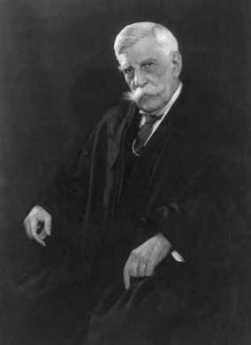
|
| Oliver Wendel Holmes Jr. |
Consider Connecticut's probable attitude toward all this. The colony was settled by Calvinist dissenters, so-called Roundheads for their surprisingly contemporary haircuts, adherents of General Cromwell, executioners of King Charles I during English Civil War. They gave Old Testament first names to their own children, and had always known they couldn't trust that licentious King. Giving their land away after he had promised it to them was just about what they always expected. When, after seventy years of growing families of fifteen to seventeen children, they discovered that Connecticut soil was merely a pile of pebbles left by the glaciers and covered with a thin layer of topsoil, they became even more convinced they had been cheated in the first place, and the bargain was no bargain. The reverse side of this enduring religious hatred will reappear in a few paragraphs.
The Proprietors of Pennsylvania, by this time no longer pacifist Quakers, but while descendants of William Penn, converted Anglicans and great friends with the King, took the matter calmly. The Connecticut lawyers were saying that if you sell or give away some land, it is no longer yours, so you can't give or sell it a second time. That is the modern view perhaps, but the English-speaking world was changing from a feudal, semi-nomadic, culture into a settled agricultural country where fixed boundaries were only starting to be important. That's where the world was going, but at the time King Charles gave away the land, it was far more important for the King to be able to reward successful underlings, and punish rebellious tribes, as the situation warranted. Ownership of land then seemed a nebulous thing at best, and the King was the best judge of how things should be divvied up.
Oliver Wendell Holmes introduced his book on The Common Law, by warning "The life of the law has not been logic, it has been experience." For life to go on and prosperity to endure, some decision must be made and held to, right or wrong. Stare decisis. That's of course fine for judges to say, but it must be observed that when people divide up on this question, where they stand depends heavily on where their ancestors stood on the English Civil War, and where their ancestors happened to be living during the so-called Pennamite Wars. As matters turned out, courts kept deciding in favor of Pennsylvania, and Connecticut kept bringing it up, again.
Albert Gallatin: Enigma Furioso
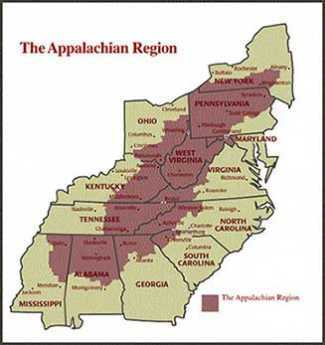
|
| Appalachia |
Abraham Alphonse Albert Gallatin was born to a rich, famous and noble family in the French part of Switzerland in 1761, but soon became a rich orphan fleeing to America in the 1780s to escape overbearing and grasping relatives. He started out in America teaching French at Harvard but soon purchased Friendship Hill, a 600-acre estate south of Pittsburgh along what was to become the National Road. At first, he ran a busy general store but soon branched out into successfully buying and selling real estate. Although Uniontown now seems a lonesome hermitage in Appalachia, it was then part of the area disputed between Pennsylvania and Virginia, coveted by both states because it seemed like the main route to Ohio when Ohio was the Golden Frontier. Friendship Hill is now a National Park, near Fort Necessity, also near General Braddock's grave, and the birthplace of George Catlett Marshall. So it had its attractions, but Gallatin led such a frenzied life it is hard to believe he spent much time there. There is a reason to believe he was one of the main instigators of the Whiskey Rebellion. Hamilton, and probably Washington, certainly thought so.
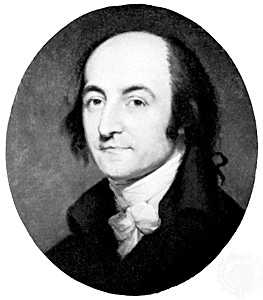
|
| Albert Gallatin |
Almost immediately after arrival in America, Gallatin threw in his lot with Thomas Jefferson in resistance to the centralizing, Federalist, qualities of the new Constitution. Both of them were looking for more liberty than the Constitution offered. The movement they led became the anti-Federalist party and would have been the anti-constitution party except for reluctance to oppose the towering figure of George Washington. Gallatin's French loyalties seem to have overcome his aristocratic family background in supporting what enemies of the French Revolution had called Jacobin (or "Republican") notions. His Swiss background additionally gave him great credibility in high finance in backwoods America. In spite of being rather out of place among Virginia Cavaliers, his personal qualities seem to have made him a natural politician. He hated Hamilton's idea of the National Bank, arguing against it effectively in the unsophisticated company. The issue was not so much opposition to banking, but to government dominance in central banking. He was certainly right that mixing the two created a constant risk of inflation from yielding to political demands, an empirical observation almost without any exception for 800 years. However, it was too early in the history of central banking to perceive that it was debtor pressure which promotes inflation. Governments are almost invariably debtors themselves, whereas the elites he was attacking, in general, become creditors, resisting inflation. Inflation is merely a variant of defaulting on debts, which debtor governments happen to have at their disposal because they control the currency.
At this early stage of central banking, America was largely using its vast amounts of land as a substitute for money, but quickly adapted to Hamilton's new monetary system which was far more flexible. Gallatin later played a role in the chartering of both the Second and the Third Banks, although his motives here were somewhat different. (Government caps on interest rates induced the Banks to lend to only the best risks, which amounted to favoring Philadelphia over the frontier, Gallatin's main constituency.) He was appointed U.S. Senator for Pennsylvania at the age of 32 but was evicted on a straight party vote on the ground that he had not been an American citizen for the required nine years. It seems likely that accusation was correct. He was soon elected a Congressman, becoming Chairman of Finance (later called Ways and Means), the majority leader after five years. In retrospect, while it seems perplexing that a sophisticated financier would oppose a central bank, his opposition may have been mainly against having politicians operate one, a rather unavoidable consequence of government control. Hamilton's idea that deliberately going into debt was a way to establish "creditworthiness" was denounced as particularly offensive by those who disdained indebtedness as the most dangerous sin of commercial life. The anti-Federalists were clearly wrong on this point, but it is possible to sympathize with their suspicions. Even today, the unwillingness of banks to lend money to someone who has no history of the previous borrowing is one of those things which seem so natural to bankers, and so irritating to apostles of thrift.
It remains unclear to history whether Gallatin had really never believed what he was saying, or had gradually changed his mind as he gained experience. He did confess or perhaps suddenly realize his error as the War of 1812 approached and he was Secretary of the Treasury. In this awkward event, he found himself charged with organizing the finance of a war with no way to do it. What was worse, Jefferson relentlessly pursued the closure of the National Bank for ideological, even fanatical, reasons; and Jefferson was the boss. The resolution of this conflict was to enrich Stephen Girard even further, while forcing Gallatin to a humiliating public reversal of stance. Nevertheless, America simply had to have a bank to fight a war. It is greatly to Gallatin's credit that his frenzied and obviously sincere entreaties to the bewildered Jefferson and Madison then saved the Nation from a disaster of foolish consistency. In a larger sense, the dramatic reversal of stance also played a role in shifting American sympathies from France to England. American sympathies were then wavering. On one side, there was gratitude to the French for bankrupting themselves with unwisely large loans to our struggling revolution, and for allying themselves with that revolution, soon imitating it with a revolution of their own against the common slogan, oppressive monarchy. True, there was more than a little hankering for the annexation of large chunks of Canada. That was one side of it, which Lafayette, Girard, Gallatin, and Jefferson labored to enhance, probably with their eye on French Quebec. On the other hand, there was that appalling genocide of the Jacobin guillotine, which Napoleon soon threatened to extend to all European monarchies within his reach. The Seven Years War, which we called the War of the French and the Indians, had left memories in America that French ambition could extend from Quebec to Louisiana and include Haiti. The French once even occupied Pittsburgh, and their Indian allies had scalped settlers in Lancaster. That was not so long ago. Furthermore, the English invention of the Industrial Revolution was immensely attractive to artisan Americans. Ultimately, we made our choice for steady prosperous commerce of the British sort, rather than glittering glorious conquest, of the French style. By 1813, Gallatin had served longer as Secretary of Treasury than anyone before or since, and earlier had a more distinguished career as both Congressman and Senator than all but a few have ever achieved. When he was offered the position as a commissioner to negotiate the Treaty of Ghent ending the War of 1812, it was natural to expect that it would be the final act of his long political career. It was, however, only the beginning of a ten-year diplomatic career as Ambassador, first to France and then to England. Following that with still another new career, he took up academic work, returning to America to found New York University, personally establishing the academic discipline of study in Indian Affairs and language, and founding the American Ethnological Society. Gallatin wrote two books about Indian language patterns and first suggested that the similarities between the languages of North and South American Indians probably meant they were related tribes. In another sphere, Gallatin is credited with originating the American doctrine of manifest destiny.
While skipping from one distinguished career to several others, Gallatin never forgot he was a banker. He wrote the charter for the Second National Bank ("Biddle's Bank"), plus the Third Bank of Pennsylvania, and founded the National Bank of New York, which was named Gallatin's Bank for a while, before gradually evolving into what is now called J.P. Morgan Chase Bank. As a diplomat, he negotiated many boundary disputes, including Oregon, Maine, and Texas. He bitterly opposed the annexation of Texas.
When it comes to writing about Gallatin, there is so much to say it is hard to say anything coherent. He was such a virtuoso of public life that he defeats his biographers in their central task, of telling the world what he was like. There haven't been many if indeed there were any, enough like him to offer a comparison. And yet history has not been kind to him. He can comfortably claim the title of the most famous American, that no one since has ever heard of.
Cost of K-12 Education

|
| Kids In the Classroom |
The April 11, 2010 edition of the Philadelphia Inquirer contained the thirteenth annual "Report Card" on schools of the eight-county Philadelphia metropolitan area. The report is eighteen newspaper pages long, mostly statistics, a real contribution to the area's understanding of itself in an important area of concern. Perhaps some future edition will take the data for a thirteen-year period and measure how things are changing over time, for better or worse. Trend analysis is often more illuminating than a snapshot of one moment in time but requires uniform data definitions. Achieving uniform year-to-year definitions can itself cause some other problems. For example, the Pennsylvania figures for teachers' salaries makes a measurement cut at $80,000 per year, while the New Jersey data samples salaries over $75,000. It's therefore hard to compare salaries between the two states, but if you want to compare a district with itself over time, you have to continue to report it the way you did last year. It somewhat depends on whether you want to study the two state governments or the individual school districts. Therefore, compromises of data collection made years ago, continue to be made for the sake of consistency. This sort of rough adjustment is just part of data management and usually proves to have had an innocent beginning. Inflation and population migration similarly make it difficult to collect data year after year which will illustrate a meaningful trend in future decades. Sometimes you measure things at the state level because small but important trends just don't show up meaningfully in the smaller school districts. That's not a criticism, that's just the way it is.
Buried within the long columns, a few numbers do fairly scream for attention. Philadelphia's 163,647 school children are 87% non-white, a "minority" group that badly needs educational help if they are to become productive members of a globalized, service (non-industrial, non-farm), economy. Unfortunately, the City is stretched to spend $11,426 per student, the lowest average of any district in the 8-county area. The lowest, remember, of several hundred neighboring districts. At the same time, the City is fast approaching bankruptcy because its present tax level drives away business. The resulting unemployment raises welfare costs, and fosters higher expenditures on crime and punishment, drawing resources away from education. The credit of the City is shaky, so closing the gap by borrowing gets harder all the time; this is a terrible moment to experience an economic recession. If you dig into this data just a little, you get an important illumination. Philadelphia teachers' salaries are lower than 80% of the neighboring region, but compared with property values, they are in the middle of the range. We are in the middle of a recession, but worse still we are in the middle of a real estate recession, where most school taxes are based. Think that over; that has to mean property values are depressed in the City and will go even lower if real estate taxes are raised. Alternatively, rising property values would result in rising tax revenue, and then the City could afford to pay teachers enough to attract them back into the City school system. Paying the lowest salaries for miles around almost certainly affects the quality of the teachers attracted to work here. At the moment, however, the City doesn't dare raise taxes. But it also doesn't dare let the school system fall apart. The city has passed the tipping point where this will correct itself, and must somehow do something dramatic to get to the other side of that tipping point. Vehement union demands make it seem that all this problem needs is more money. That's far from enough; since it's hard to see where the money would come from, it's anyway vital to be thinking of nonfinancial solutions as at least as important as financial ones.
The school system doesn't show up very well in the statistics. More than half of the city high schools send less than half of their students to some kind of college. Leaving college quality to one side, only one of the hundreds of eight-county school districts also sends fewer than half its class to college; most of them send 80-90%. And the one non-Philadelphia school district in the region which sends only 38% to college is the City of Chester, which has problems similar to those of Philadelphia. Outside the city limits, this metropolitan region is doing fairly well in the struggle to educate its next generation for a globalized economy. But unless something pretty dramatic is done, the inner city will not be able to cope with low-cost foreign labor, nor will it be suitable for the better-paying jobs, while employers could actually be starving for educated labor, but totally unable to make use of uneducated job applicants, once the recession is over.
For centuries, Philadelphia subsidized the farm regions of Pennsylvania, in the sense that it contributed more state tax revenue than it received back in benefits. Ever since World War II, however, the rest of the state has been subsidizing Philadelphia and hates this situation with a lethal political passion. During the last half of the 19th Century and particularly with the automobile in the early 20th Century, the agricultural workers of Central Pennsylvania have migrated to the city to take industrial jobs. There is no going back; agriculture now only employs 2% of the nation's population, industrial employment is going in the same direction. The former agricultural/industrial workers must somehow get themselves educated enough to face new challenges. We have twelve million illegal immigrants in America; the appalling thing is to hear we may need their labor because somehow twelve million legal immigrants aren't up to the task. Once they get mixed up with recreational drugs and the criminal justice system, what little chance they had for advancement rapidly fades. The Chinese tackled this same problem by forbidding reproduction. Industrial Europe tackled this problem with famine and wars. Because Americans can't even discuss such approaches, it looks as though there is nothing to do, but that isn't so. We've just exhausted our traditional approaches.
During the 19th Century, for example, the Catholic school system of Philadelphia was one of the wonders of America. That's what Cardinal John Henry Newman was all about, and he richly deserved to be sainted. For reasons remote from this discussion, the Catholic Church school system lost considerable vigor in America. That sad process seems to be continuing a downward spiral, so it's doubtful it will revive soon. Perhaps the charter school approach can fill the void, perhaps a voucher system of school choice has something to offer. Meanwhile, Catholic schools are feeling a drop in enrollment, some are closing; the most common complaint is that the current recession in the economy has made the tuition to Catholic schools a serious handicap to competing with charter schools in their neighborhood, where the education is said to be at least as good, and free. A shorthand description of the politics here is the public school teachers union fear vouchers for school choice, and the Catholic schools fear tuition-free charter schools. What might be helpful would be a realignment of incentives within a voucher system which would benefit all three school choices instead of victimizing the public schools; standardized testing at least opens the way to devising a reward system to inform the flow of public subsidies. No one is interested in a system like that in France, where every student in every school is looking at the same page of the same textbook every day. The goal is to reward objective educational improvement, under any or all management structures; and the main problem is to be objective about the measurement of it.
Maybe we should legalize recreational drugs, but then maybe we should legalize recreational crime; bad ideas will always come forward in a crisis, and someone must have the fortitude to reject them. And someone has to have the fortitude to face down the Teachers' Unions; it was better if that someone is black. Someone must face down organized crime, quite regardless of the crime product popular at the moment; it was better if that someone could be of Italian extraction. Right now, it looks as though the state government of New Jersey came close to being dominated by an informal network of gamblers, criminals and public service unions. We are close enough to watch with awe as a former prosecutor takes a meat ax to what he learned when he was an investigator. One hopes for his success while watching uneasily to see if he can himself remain within legal norms. Philadelphia remains of the mindset of buying its way out of the education problem; that's not going to work.
For one thing, it seems to have been unsuccessful in neighboring Camden. Once more referring to the Inquirer's educational report card, Camden produces some documented warnings. Camden spends $16,131 per pupil, about half again as much as Philadelphia. Camden teachers are paid in the top quintile for the state, class size is nearly the smallest in the state. About 88% of the money is contributed by the state government, which temporarily at least solves that particular issue. In spite of this spending, Camden has the highest crime rate in America, its school population remains 99% nonwhite, only 38% of those who struggle to high school go on to college, and their SAT scores are the lowest or nearly the lowest in the state. Perhaps in time, the education will improve; there is little sign the economics of the city has improved. Lots of abandoned building have been torn down, nothing new has been constructed except with public tax money. Money may be necessary for urban revival, but it certainly is not the central solution. Until the politics improve, there is little likelihood that civil society, non-government organizations, can produce the leadership so strikingly missing. The corrupt government must at least get out of the way.
Because more money without civic engagement probably cannot solve the problem, gimmicks to beg or borrow money may be a distracting blind alley. Philadelphia consolidated the city with the surrounding suburbs 150 years ago. That seemed for a while to bring prosperity, but its instability in the face of declining resources is one of the main reasons the 1929 depression was so particularly destructive to overextended Philadelphia. The city was no longer right-sized for its population. When the urban population fled to the far suburbs, not only was further political consolidation impossible, the intervening deserted areas of West Philadelphia, Germantown, and North Philadelphia became slums, so large in area as to be beyond all hope that population growth could soon fill them. As you travel on Amtrak either north or south, the border between Philadelphia slum and suburban greenery is sharply visible at the artificial political borders. The slums grew outward to the border and stopped, the suburbs grew inward to the border and stopped. If the borders moved closer to City Hall, the suburbs would follow; just look at Conshohocken. There's little likelihood of that happening soon, and most of the reason is the present centrifugal mindset of the populace. In their view, the further out you go, the richer you will get. When reality sets in on that particular delusion, perhaps the matter can be reopened. The point right now is that we tried to make the suburbs support the urban core, once, and that opportunity is all worn out. It would be much more useful, not necessarily easier, to introduce some civility into state government.
Pea Patch Island

|
| Fort Delaware |
There's a tradition that a boatload of peas ran aground on the mudflats of Delaware Bay near Salem in the Sixteenth Century, turning the flats into a patch of peas. In any event, the island is known to have been growing in size for centuries, and now is home to about 12,000 families of Herons. The number of mosquito families has not been accurately counted as yet, but they are even more numerous. The island doubled in size when the Army Corps of Engineers built the present Fort Delaware on it in 1847-59.
The War of 1812, which included the burning of Washington DC and bombardment of Baltimore, propelled America into a frenzy of coastal defense, and the first fortification of Pea Patch Island took place in 1813. A plan was adopted by Congress in 1816 to build 200 coastal forts, and about forty of them were actually completed by the time of the Civil War. These forts all had a similar appearance; the most notable example of the style was at Fort Sumter near Charleston, South Carolina, which was nearly complete by the time of its famous bombardment. In fact, it was first hastily occupied by Northern defenders arriving just in time to be evicted. In essence, these forts were huge walls of bricks with a concrete outer shell, holding a couple dozen very large cannons and a parade ground.
The new river defenses of Philadelphia were to be provided by three forts, Fort DuPont at the mouth of the old Delaware-Chesapeake canal, Fort Delaware on the island, and Fort Mott on the New Jersey side. You can now take a ferry ride to all three, between April and September; it's a pleasant afternoon excursion. Not so many years ago, you had to go into an ominous little taproom in Delaware City and ask in a loud voice if someone wanted to take you to Pea Patch in a fishing boat. The scene was reminiscent of old movies about derelicts hanging out in Key West, complete with George Raft and Ernest Hemingway, but now the National Park Service has given it the characteristic NPS spruce-up, with pamphlets and restrooms.
The place never had any serious military activity except when it was used to house Confederate prisoners after the Battle of Gettysburg. Over 12,000 prisoners were brought there, and there were about 3000 deaths among them. Historians have compared the treatment of Confederate prisoners with the treatment of Union prisoners at Andersonville, Georgia, and it would be hard to say which place was worse. There are certain diseases of poor sanitation, like typhoid, cholera, amoebic and bacillary dysentery, and hepatitis, which decimate all concentration camps at all times. And adding to them the mosquito-borne diseases of both Delaware and Georgia at the time, you don't really need to assert prisoner mistreatment to account for the morbidity and mortality. Undoubtedly there was some of that.
The No-Doctrine Doctrine
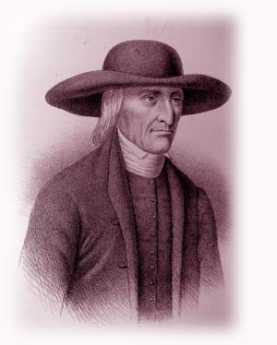
|
| quaker |
Although Quakers have long been famous for good relations with the Indians, both groups strongly prizing simplicity and keeping your word, few Indians converted to Quakerism. Indians would attend the silent meetings and listen respectfully, but in the end, Christian converts were far more likely to convert to the Moravian Church. To resist defining your common beliefs creates automatically a problem for explaining what you believe. It becomes acceptable to believe a wide range of things, but it is also acceptable to believe very little. Not surprisingly, the two great religious schisms of the Quakers have broken their unity on just this point.

|
| A History |
The first great Quaker schism was created by one George Keith (1638-1716), who was born a Presbyterian and died an ordained Episcopalian. For several decades, however, Keith was one of the foremost leaders of the Pennsylvania Quakers, partly as a result of being just about the best-educated man of the Colony. His leadership, however, led him to crave a more defined set of Quaker doctrines, and when he carried this idea too vigorously, he eventually encountered implacable opposition which in time caused him and his considerable number of followers to be expelled from the Society of Friends. (George Keith should not be confused with Sir William Keith, whom Hannah Penn appointed as governor of Pennsylvania in 1717.)
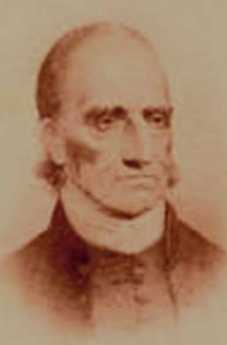
|
| Elias Hicks |
The first great schism was thus about whether there might be too little defined doctrine in Quakerism. The second great schism, by contrast, grew out of the feeling there was too much doctrine. Led by Elias Hicks in 1830, the Hick sites split off from mainstream Quakerism in a quest for more simplicity, less religiosity, more silent contemplation of the Inner Light. In a sense, the outward show of protest in the black hats, plain dress, the plain speech had provoked a reaction that these things were no longer simple, they were ostentatious. Too many people were being "eldered", too many people were being "read out of the meeting" for violating doctrinal rules.
Curiously, both rebels were cast out, but over each following century the church as a whole gradually adopted what was largely their view of things. After Keith, Quakerism became more rigid and formalized. After Hicks, it became more mystical and free-thinking.
By insisting that in spite of turmoil it caused no doctrine was to be defined, Quakers have edged into the negative position of defining what they are not. Unlike the early sects of Christianity, Quakers have discarded the hope of miraculous divine intervention as a reason to behave in a Friendly Christian way. No one is apparently going to revive your bones from the tomb, feed your multitudes with forty loaves, or descend from Heaven and drive your enemies into the sea. Neither a later reward in Heaven nor a forthcoming everlasting punishment in Hell can be regarded as either very likely or much of an incentive to good behavior. Other religions may believe these things and might even turn out to be right, but Quakers feel the unembellished Golden Rule is a sufficiently understandable motive for conduct.
And gentle indirection is often a better way to persuade others than thundering oratory. The story is told of a visitor who found himself in a Quaker gathering and made polite conversation by asking what the Quaker position was on the Trinity. A sweet old gentleman is said to have smiled and said, "We believe in the following Trinity: The brotherhood of man, the fatherhood of God -- and the neighborhood of Philadelphia."
Children's Scholarship Fund (1)

|
| Children's Scholarship Fund of Philadelphia |
Ida Lipman recently visited the Right Angle Club, to acquaint members with the nature of the club's new charity, the Children's Scholarship Fund of Philadelphia. This fund could be seen as a response to the rising realization that the nation's leading social problem is fast becoming one of upgrading the educational strength of the current generation of poor people, who face hopeless odds competing for unskilled jobs against a vastly larger population of foreign poor people in a globalized economy. Our poor people can never hope to rise out of poverty by taking jobs that foreign competitors are willing to perform at even lower wages. And while everyone hopes our poor people can take on better-paying jobs, it requires better education to do it. Ultimately, the question for America is whether to place the emphasis on better teaching or better learning, and the two are not quite the same thing.
The educational problem of motivating children to higher attainments than their parents is a difficult social task in both urban and rural districts, but self-defeating peer pressures to hold down their classmates somehow seems a stronger force in the urban settings. In both environments, of course, the educational attainments of both the parents and the teachers have been aimed at a lower level than the task requires. It somehow proves unrealistic to shift expectations as rapidly as we need to, and part of the present problem is that the education industry has become demoralized by repeated defeats. Consequently, we are certainly lucky that philanthropic donors have been willing to support some radical experiments in the whole educational experience, including students, teachers and parents.
Thus, the Children's Scholarship Fund has been willing to dispense several thousand scholarships to private schools in the Philadelphia region, purely by lottery, without regard to the traditional guidepost of student merit. This policy would probably be disruptive if scholarships were universally available, undermining the spirit of meritocracy which is so central to our educational system. But since we are only partially addressing the failures of a system of universal free public education, a stronger argument can be made that changing the culture occasionally requires that we set aside the traditional incentive of rewarding the behavior we seek. The hope is that a demonstration project with such a radical change will set other motives into motion. Resources are limited; it is recognized that among the ninety percent of students who fail to receive the scholarship by lottery, there will be many who are more talented than the few who are lucky enough to get an award. The point is easily overlooked however that scholarship students must apply for this lottery, and be supported by partial financial assistance from their parents. These parents must sincerely want to raise the educational goals of their children, and convey that motivation to the kids in whatever way they are able to convey it. The pressure of less lucky playmates and neighbors to hold them back, it is hoped, will be lessened by the simple recognition that a lottery gives everyone an equal chance, provided only that they step forward and pledge themselves to try to succeed.

|
| John Walton of the Wal-Mart family |
It's a bold and imaginative approach, a highly counter-intuitive one. John Walton of the Wal-Mart family matches the contributions of other donors at fifty cents on the dollar through his family foundations, which was jointly founded with Ted Forstmann of the Wall Street firm. Many longitudinal studies will eventually show how much this bold and charitable venture really helps the students and the community; since it is private money in use, criticism should be held back until the results begin to be apparent. To whatever degree and in whatever way the scholarship fund is a success, the public must be willing to praise both its spirit of generosity, and its willingness to take a chance. Let's all mark this down in our notebooks, to see how it all turns out in ten or so years.
Tour of Duty in 'Nam

|
| Vietnam War |
Col. Dan McCall talked to the Right Angle Club about wartime experiences in Vietnam recently. He really didn't want to, though he was being asked to talk about retirement planning, or asset allocation, or something else he knew something about. But the Program Chairman this year is also a Colonel, and wasn't about to be talked out of it; he wanted Vietnam, sir, and nothing else. So, for the first time in forty years, he did. He hadn't talked about it with his family or, during a career rising from Lieutenant to Colonel, with his associates in the National Guard.
Perhaps a little slow and fumbling at first, we heard of going to a place where it's 120 degrees in the shade, every day. Where he fainted from a heat stroke on the first day off the plane in Saigon, and soon found that it happened to everyone. Within thirty days, every single person had dysentery. The plane that lands troops in Saigon doesn't turn off the engines, and takes off as soon as the last man deplanes. As well it might because it attracts sniper fire as it takes off. Once there, the only form of transportation for anyone going anywhere is by helicopter; plenty of peasants with chickens in their laps are taken along, too.

|
| Ho Chin Minh Trail |
His unit, the 82nd Airborne, was deployed to the west of Hue, the ancient capital. The country is near the border with North Vietnam, and the land is a fairly narrow strip between the ocean and the Laotian border. The Ho Chi Minh trail, where the enemy comes from, is just over the border inside Laos. Our troops never go there, but B-52 bombers go there plenty, leaving impressive craters in the ground. The unit was mortared every night, and rockets made an impressive noise as they went overhead toward Hue. The American forces almost never went out at night. Deployments in the jungle lasted 45 days, without baths or toilets; mostly, you walked into the enemy by accident on the trail. One of the prizes was a Chinese officer, carrying much better maps of the region than the American Army had. One night, sniper fire seemed to be coming from a small island in the river, and the response was to send thousands of shells back, filled with 3-inch steel darts. The next morning, every tree on the island was normal enough on the Laotian side, but nearly covered with steel darts on the Vietnam side. Although the command from headquarters was to report a body count, there were no bodies to count. At the end of one 45-day deployment, there had been no food or water for three days. When the "ships" came to take them out, there was a celebration with rice wine. You make rice wine by soaking stalks of rice in water, letting it ferment. The water is pretty murky, to begin with, and gets worse as it ferments; you have a good time, anyway, with the villagers bringing in a pig to roast.

|
| 82nd Airbourne Patch |
The CIA had its own private army, Rangers and Special Forces. There were local mercenaries, mostly from Thailand. The 82nd Airborne - The All American Division - had a tradition of parachute jumping in every military engagement since World War II, but in the jungle there was no place for, or point in, jumping. But at the end of their deployment, they jumped once, anyway. When you got home, the movies were kind of a joke, but Apocalypse Now came close to giving the right feeling. Although of course people asked what it was like, you didn't talk about it. No one did.
One member of the Right Angle Club who had spent a year there, muttered an answer. "And people didn't really want to hear about it, either."
Original Intent and the Miranda Decision

|
| Ernesto Arturo Miranda |
At the lunch table of the Franklin Inn Club recently, the Monday Morning Quarterbacks listened to a debate about Guantanamo Bay, prisoner torture and police brutality; all of which centered on the Supreme Court decision known as Miranda v Arizona. Ernesto Arturo Miranda was convicted without being warned of his right to remain silent, sentenced to 20 to 30 years in prison in 1966. Eventually, the U.S. Supreme Court, with Chief Justice Earl Warren writing a 5-4 decision, overturned the conviction, because Miranda had not been officially warned of his right to remain silent. The case was retried and Miranda was convicted and imprisoned on the basis of other evidence that included no confession.
An important fact about this case was that Congress soon wrote legislation making the reading of "Miranda Rights" unnecessary, but the Supreme Court then declared in the Dickerson case that Congress had no right to overturn a Constitutional right. Some of the subsequent fury about the Miranda case concerned the legal box it came in, with empowering the Supreme Court to create a new right that is not found in the written Constitution. Worse still, declaring it was not even subject to any other challenge by the other branches of government. In the view of some, this was a judicial power grab in a class with Marbury v Madison.
Several lawyers were at the lunch table on Camac Street, seemingly in agreement that Miranda was a good thing because the core of it was not to forbid unwarned interrogation, but rather a desirable refinement of court procedure to prohibit the introduction of such evidence into a trial. The lawyers pointed out the majority of criminal cases simply skirt this sort of evidence, use other sorts of evidence, and the criminals are routinely sent or not sent to jail without much influence from the Miranda issue. Indeed, Miranda himself was subsequently imprisoned on the basis of evidence which excluded his confession. What's all the fuss about?
And then, the agitated non-lawyers at the lunch table proceeded to display how deeper issues have overtaken this little rule of procedure. This Miranda principle prevents police brutality. Answer: It does not; it only prevents the use of testimony obtained by brutality from being introduced at trial. Secondly, Miranda contains an exception for issues of immediate public safety. Answer: What difference does that make, as long as the authorities refrain from using the confession in court? The chances are good that a person visibly endangering public safety is going to be punished without a confession. Further, the detailed procedures within Miranda encourage fugitives to discard evidence before they are officially arrested in a prescribed way. Answer: If the police officer sees guns or illicit drugs being thrown on the ground, do you think he needs a confession? Well, what about Guantanamo Bay? Answer: What about it? We understand the prisoners are there mainly to obtain information about the conspiracy abroad and to keep them from rejoining it. The alternative would likely be their execution, either by our capturing troops or by vengeful co-conspirators they had incriminated.
Somehow, this cross-fire seemed unsatisfying. The Miranda decision was made by a 5-4 majority, meaning a switch of a single vote would have reversed the outcome. The private discussions of the justices are secret, but it seems likely that some Justices were swayed by this edict viewed as a simple improvement in court procedure rather than a constitutional upheaval; Justices with that viewpoint feel they know the original intent and approve of it. Others are apprehensive the decision has already migrated from the original intent, in an alarming way. Everyone who watches much crime television and even many police officials feels that Miranda intends for all suspects to be tried on the basis of total isolation from interrogation from start to finish. More reasoned observers are alarmed that the process of discrediting all interrogation will lead to an ongoing disregard of the opinion of lawyers about court procedure, essentially the process of allowing public misunderstanding to overturn legal standards. Chief Justice William Renquist, no less, poured gasoline on this anxiety by declaring that Miranda has "become part of our culture".
What seems to be on display is the mechanism by which Constitutional interpretation drifts from the original intent. Not so much a matter of "Judicial Activism" which is "legislating from the bench", it is becoming a matter of non-lawyers confusing and stirring up the crowds until the Justices simply give up the argument. Drift is one thing; virtual bonfires and virtual torch-light parades are quite another.
The Proprietorships of William Penn
William Penn became first interested in the Colonies when he acquired New Jersey as an investor in what started out as the bankruptcy proceedings of a client. Unlike his spoiled children and grandchildren, he was sincerely interested in helping the persecuted members of his new religion, and those who later totaled up his lifetime finances found that overall he lost money on his real estate ventures. His descendants, however, were mainly concerned with selling real estate, and soon reverted to Anglican church membership. When William Penn later received Pennsylvania and Delaware from the King of England (Charles II, the Stuart King restored with the help of his Admiral father), he not only owned these territories but for practical administrative reasons was offered the right to rule them. By then Penn's main future intention was to found a refuge for Quakers and other religious dissenters, so becoming a vassal King was graciously declined. Instead, he became a real estate Proprietor, after satisfying himself about the government and other arrangements in only a general way. At least half the original 13 colonies were also proprietorships, although the terms of their grants had great variation. Penn's intention for the proprietorship was to sell off as much of the property as possible, sort of benignly watching the process unfold in the parts he had sold.
There were two unforeseen flaws in this benevolent idea; the first was that his sons and heirs would abandon the Quaker faith and have little interest in his holy experiment except for the revenue it returned. The second flaw was to fail to see that vigorous religious toleration might eventually lead to the Quakers becoming outnumbered in their own refuge. Eventually, there does come a time in the real estate sell-off process when you have sold more than you retain. After that point, you may no longer dominate the politics, and in fact, that happened far sooner than half-way, because of Penn's unwillingness to employ force .
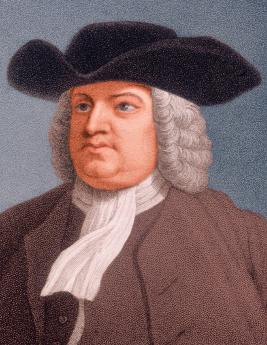
|
| William Penn |
In land value, although perhaps not in land area, that point of loss of control had been reached by the middle of the eighteenth century, and it led to a famous battle between the Penn descendants and Benjamin Franklin. The Penn family saw no justice in paying taxes on the land they hadn't yet sold, or obeying laws created by their customers which extended beyond the land they owned; if they wanted to rule it all, they should buy it all. Franklin took the part of the settlers and immigrants, who resented paying taxes and fighting Indians on behalf of someone who still owned vast stretches of the land "within" the colony. A significant factor in this peculiar argument is that Thomas Penn, the dominant chief of the family descendants, had a deep and abiding suspicion of Franklin, dating back to that episode related in Franklin's Autobiography where Franklin raised a militia in King George's War when the pacifist Quakers refused to do so. Both sides had some justice in their positions, both sides appealed to the King. The Penns knew the King better, so Franklin lost. That was mostly what Franklin was doing in London in the years before the Revolution, and eventually, it took a Revolutionary war to resolve the issue. Some have said the episode showed Franklin was not as shrewd a politician as history books would portray him. In fact, it more likely emphasizes that Franklin was a loyal British subject right up to 1775. His position was that all parties were and forever would be, inhabitants of the British Empire, so they had equality under British rule. The Penns felt they had a right to consider Pennsylvania their own sovereign property, under which the colonists had no rights until they paid for them. It is easy to see how the notion of independence could take hold in this curious reversal of roles. Nevertheless, Pennsylvania did resolve the issue with the appearance of lawfulness, although with restrained generosity. To quote Sydney G. Fisher, writing in The Quaker Colonies, "When the people could have confiscated everything in Pennsylvania belonging to the proprietary family, they not only left them in possession of a large part of their land but paid them handsomely for the part that was taken." The matter is generally considered to have been finally settled by the Confirming Act of 1787, although few would now contend that fifteen pennies per acre is or was a handsome price.
And so, the Pennsylvania proprietorship was dissolved. In New Jersey, on the other hand, the proprietorship still exists. The land between the North River (Hudson) and the South River (Delaware) was divided into two proprietorships by a line drawn between the Delaware Water Gap, and Beach Haven on Long Beach Island. The southern segment was called the Proprietorship of West Jersey, informally peopled by English Quakers, and a northern half, the Proprietorship of East Jersey, informally ceded to Scots Quakers who proved to be more Scottish than Quaker. Temperamental differences might well have eventually led the two segments to take opposite sides of the 1860 Civil War except that it was the northern half that sympathized with slavery and the Southern Confederacy, while the Proprietorship of West Jersey was mostly where the anti-slavery movement began, with a Quaker named John Woolman. As matters turned out, neither slavery nor taxing unsold land became irreconcilable issues in the Jerseys. Unsold land of the Proprietorship was already fairly minor in New Jersey at the time of the Revolution, but the issue hadn't been forgotten by the Proprietors, either. A couple of the stockholders of the proprietorship were members of the Constitutional Convention. When the time came that other delegates urgently needed New Jersey's vote to ratify the new constitution, the Proprietor problem was "explained" to the other states. The outcome was that the proprietorship tacitly agreed to be taxed and regulated like any other property owner, while their own rights were respected as persisting under the new Constitution. Such a sensible outcome was probably not possible in Pennsylvania because there was so much more unsold land to fight about. The peacefully accepted consequence in New Jersey, even today, is that when the ocean creates a new strip of beach or a farmer abandons some land on the other side of a turnpike, it reverts to the Proprietorship as undeeded and untitled land. As such, it legally belongs to a little group of stockholders who meet once a year in Burlington or Salem, under a tree, and who can actually pay themselves annual dividends. It is however only true in half the state; the Proprietorship of East Jersey surrendered its rights to the State in 1998.
In Delaware, things are a little fuzzier. Delaware was once part of Pennsylvania, as its lower three counties. John Dickinson was once Governor of both states, but they had two legislatures from 1700 to 1776. The last time the proprietorship matter came up, so far as real estate lawyers can remember, was in the shifting sandy beaches of Cape Henlopen; things were smoothed out by making the disputed land into a state park.
REFERENCES
| Encyclopedia of New Jersey | Google Books |
| The Problem of West Jersey | JSTOR |
| The Oxford History of the British Empire: The Origins of the Empire | Google Books |
| A Map of East and West New Jarsey | JPG |
| Council of Proprietors of West Jersey | westjersey.org |
| Magna Charta: Part I: The Romance of the Great Charter; Part II: Pedigrees of the Barons: John S. Wurts: SIN: AB0006D91C4 | Abe Books |
| West New Jersey: The Peculiar Province: ASIN: B00072HGTE | Amazon |
| Why the Private School?: Allan V. Heely: ASIN: B000GR1QS2 | Amazon |
Addressing The Proprietors' Dilemma
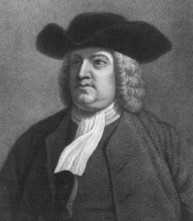
|
| William Penn |
DURING the century which elapsed after Charles II gave away Pennsylvania to William Penn, several hundred thousand people moved in and changed the place. Transformation of the wilderness explains why the terms of the grant seemed logical at one time, but proved almost impossible to manage at the time of the Revolution. The Penns with thirty million acres was the largest landholders in America but, in fact, by 1776 only five million acres had been sold in a century. The land they held was simply too much for one family to handle without an army, and although the original settlers were pacifists, the later ones were combative.
Charles II had written in the Charter that the Penns could have the land if they could maintain order there, retaining the legal right for the King to recover the land if they didn't. This fall-back provision certainly reflects some doubt about the ability of pacifists to shoot the necessary number of Indians, Frenchmen, and Spaniards. On the other hand, the motive for a King delegating away his authority in the first place became clearer when the Penns experienced severe financial strain defending the Northeast corner of the state against the Connecticut invaders. It furthermore helps us understand why Benjamin Franklin received such a cold reception when he was sent to London by the colonists to request the crown to reassert civil authority over the state. That did not necessarily imply stripping the Penns of their land; by this time, it was clear that the Penn Proprietors were mainly interested in selling it to someone. The charter of the King's grant included the offer to make William Penn a King; and although the offer was declined, the Penn Proprietors retained some degree of legal power to govern the territory. Franklin for all his persuasive power was, unfortunately, the one man Thomas Penn didn't want to see, because of the threat he had posed by raising a militia in King George's War, and later his expansiveness at the Albany Conference. And Thomas was a good friend of the King. The King didn't want these problems and particularly didn't want the expense. Ambiguities were, of course, shared all around. William Penn had quite shrewdly seen it was more sensible to treat the Indians decently than to fight with them, and cheaper too; the lesson was not lost on the British crown. But the French Kings posed a much larger world-wide threat to the British colony, finding for their part, it was rather economical to supply munitions to the Indians on the frontier and stir them up emotionally. The French and Indian War was a small component of the Seven Years War, which proved to be a costly adventure for both sides. Its local cost certainly overwhelmed the ability of one family to underwrite local governance in a large wartime colony, and it jeopardized the finances of the British Monarch to carry the rest. The resulting need to tax the colonies for their defense sent things downhill, eventually to the Stamp Act, the Townshend duties, and the Tea Tax. Everyone made lots of mistakes as the whole structure underwent revision, just as pacifists are certain will happen in any war. But when a pacifist utopian colony was prospering while successfully dealing with the Indians, it's all sort of a big pity.
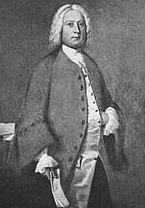
|
| Thomas Penn |
With much to lose, the Penn family did pretty well with the resources at hand. By the time of the Revolution, three generations of Penns had divided up ownership shares of the Proprietorship. When French and Spanish ships were marauding the Delaware River, Benjamin Franklin the local printer took it on himself to organize a militia which persists today as the Pennsylvania National Guard, the Twenty-eighth Division. Franklin was suddenly a local hero to everyone, except to one man, Thomas Penn. Thomas was the dominant figure in the Penn family for many years and worried deeply about Franklin, a man who could stir up ten thousand armed volunteers with a poster proclamation. Such a man could mean trouble, as indeed events later proved to be the case.
John Penn was the Governor of the state, residing in his mansion on the Schuylkill called Lansdowne, doing his best to ingratiate the locals. He struggled to be diplomatic when arguing for the decisions actually made by his Uncle Thomas in London. Thomas Penn, on the other hand, was an important friend of the British Ministry, and a notable person in aristocratic England. As the Revolutionary War approached, the problem transformed into how to hold on to 25 million unsold acres, while remaining unsure who was going to win the impending war.
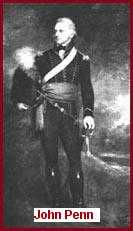
|
| John Penn |
The strategy the Penns adopted was to get out of the business of running a local government, as Franklin had proposed but in a different way. John Penn the Governor became a private citizen, just a local real estate agent. He took an oath of allegiance to the Revolutionary government, which in the chaos of the time was equivalent to becoming an American citizen. Meanwhile, other members of the family remained in England, ready to revise the arrangement if the British won the war. It was all fairly transparent straddling of the issues, which was only even remotely likely to be effective because of the enormous store of Penn goodwill built up over a century. In 1789 revolutionary France, for example, such sentimentality would not have delayed the tumbrels to the guillotine for five minutes.
Meanwhile, an unexpected difficulty was created. By withdrawing from control of the local government, the Penn family also withdrew from the defense of state borders against neighboring colonies. Under the circumstances, the Penns were afraid to appeal to the King, while the new government of Pennsylvania found the Articles of Confederation were merely a wartime tribal compact. The Articles stabilized boundaries mainly for the purpose of conducting a united war, and did not seriously contemplate a continuing judicial role for disputes between colonies. When the Revolution was finally over, the Penn Proprietors were not left with much of a bargaining position. The new State of Pennsylvania offered, and they accepted, about fifteen cents an acre to surrender their claims. In Delaware, they got essentially nothing for those three counties. Only in New Jersey did the Proprietors' claims remain durable after the new nation was established. The Proprietorship of East Jersey survived into the late 20th century, and the Proprietorship of West Jersey continues to return a small profit even today. The New Jersey curiosity is treated in a separate essay.
William Penn, Excellent Lawyer, Terrible Businessman
Richard Dunn, who with his wife Mary Maples Dunn stand as the two core authorities on the life of William Penn, merely smiles when asked to describe what Penn was really all about. "What we need is to have one good biography emerge," said he, "but it isn't easy to guess what it will say". For the present, let's just sketch a few paradoxes which somehow need threading together.
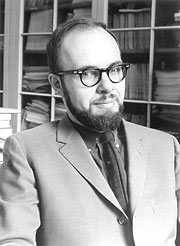
|
| Richard Dunn |
In the first place, the wealth of William Penn can only be described as prodigious. His father had played a central role in restoring the Stuart monarchs, and in the course of it had conquered for the Crown the enormously valuable property of the Island of Jamaica. For these efforts, the father had been rewarded with extensive properties in Ireland and a highly influential position at Court. To all of this was overgenerously added as debt repayment, the American territories which have now become the states of Delaware, New Jersey, and Pennsylvania. Actual ownership of some of this was shared with others, but all of it was quite effectively controlled by young William. No one else stands even close as the largest private landholder in American history. But to appreciate the immensity of his wealth, it should be understood that he treated this property as a sort of hobby. Over the course of his lifetime, the colonies lost money, and Penn subsidized them rather seriously from his other assets.
At the same time, Penn lived vastly beyond his income in ordinary ways, becoming heavily indebted, eventually going to debtor's prison. It probably was not necessary; his sons renounced Quakerism and made a profit on the colonies after they inherited them. Although he could display remarkable organizational talent, particularly in the organization of New Jersey, his management was mostly slack, his judgment of agents often proved too trusting, and he permitted himself to be exploited by poorly-designed contracts to his eventual financial ruin. Even that might not have been serious; he displayed a towering legal mind in the devising of the doctrine of jury nullification and was the winner in a great many lawsuits. He even demonstrated he was capable of winning dubious lawsuits, soundly defeating Lord Baltimore in a border dispute over Maryland which others have said showed Baltimore had the stronger case. We know he had influence at Court, and such legal victories suggest he might on occasion have taken full advantage of it.

|
| Gulielma Maria Springett Penn |
From the sound of things, some have concluded Penn was so rich and powerful he grew careless about his own best interests, which essentially needed very little defense. In particular, he gave this impression to his fellow Quakers, who concluded he did not need nor likely would stoop to collecting what he was owed in taxes and property sales. This cavalier attitude encouraged the early Quaker merchants to follow their own advantage without shame, and as it happened with great vigor. The Constitutions he devised for the colonies are frequently cited as the brilliant cornerstones of fairness and stability, ultimately the models for much of our present Constitution. Penn really was sincere in wanting to provide a better life for the working people than they could have at home in England. But in the Seventeenth Century, the modest role he devised for the Proprietor commanded little respect and was not one his aggressive clients would have chosen for themselves in his position. Perhaps the most generous description of their passive aggression would be that he taught power and governance to be the collective possession of the whole Quaker meeting, so the leaders of the meeting simply took him at his word. For their part, there can be little doubt of their commercial talents; trade and industry immediately thrived in the colony. However, sharp, aggressive trade and commerce were not things a gentleman would himself want to associate with.
Unfortunately, the historical records of the early colonies are not good; for the most part, we have to surmise the struggles and frictions between a rich, financially careless, and sincerely earnest theologian in his contention with a group of poorly educated strivers who had been told he regarded each of them to be his equal. As the saying goes, he was rich beyond denying. And therefore, he was probably arrogant beyond his own ability to see it as a flaw.
Equal before the law, perhaps, and equal in the prayers of First-day Meeting. But everything about his upbringing, his social circle in London, and his staggering wealth suggested that even a saint would have trouble believing, deep in his heart, that these were truly his equals. And even if perchance he did believe it, they would not have believed it for a moment, had their positions been reversed. Penn certainly acted as though he believed in religious freedom, serene in the idea that if every person earnestly thought hard about ethical issues, everyone would eventually reach about the same conclusion. The elders of the meeting, however, behaved in ways which suggested they would personally prefer non-Quakers to settle somewhere else, and given half a chance would create Quakerism as an established church. There seemed to be those who felt that Friend William was perhaps a little too trusting. And anyway there were some obvious paradoxes. William Penn kept personal slaves.

|
| Hannah Callowhill Penn |
With two wives, William Penn had thirteen children. Among them was considerable diversity of opinion, along with the same tendency to rebellion found in any two generations. Early illnesses and chance led to the emergence of those children who renounced Quakerism and showed no shame at all about wanting to have money in order to spend it recklessly. One would have supposed that a man of Penn's intellectual stature would have been able to control his family better, but his own reckless youth had been so extreme that he had few arguments available when, as seems virtually certain, rebellious children defended themselves by reminding him of his own indiscretions. William Penn displayed absolutely no sense of humor; a touch of it would have been useful in mastering a family and friends who were undoubtedly having a little trouble knowing what to make of this apparition in their midst. Some equally pompous Pennsylvania merchants might have had difficulty denying that in their passive aggression, they occasionally resembled the spoiled brats with whom he found he had ample family association.
REFERENCES
| Remember William Penn, 1644-1944: A Tercentenary Memorial : Edward Martin: ISBN-13: 978-1258369934 | Amazon |
Political Parties, Absent and Unmentionable
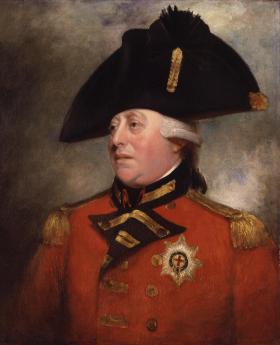
|
| King George III |
BECAUSE America had recently revolted to rid itself of King George III, the Constitutional framers of 1787 sought to construct a government forever free from one-man rule. Inefficiency could be accepted but central dictatorial power, never. It is unrealistic however to expect a wind-up toy to keep working forever, and our Constitution creates the same worry. After two centuries, some chinks have appeared.
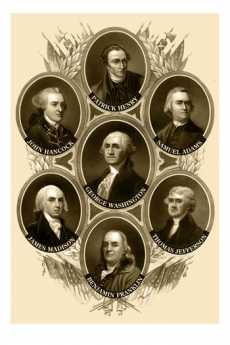
|
| Founding Fathers |
Political parties existed in 18th Century England and Europe, but the American founding fathers seem not to have worried about them much. Within ten years of Constitutional ratification, however, Thomas Jefferson had created a really partisan party which naturally provoked the creation of its partisan opposite. James Madison was slowly won over to the idea this was inevitable, but George Washington never budged. Although they were once firm friends, when Madison's partisan position became clear to him, Washington essentially never spoke to him again. Andrew Jackson, with the guidance of Martin van Buren, carried the partisan idea much further toward its modern characteristics, but it was the two Roosevelts who most fully tested the U.S. Supreme Court's tolerance for concentrating new powers in the Presidency, and Obama who recognized that the quickest way to strengthen the Presidency was to weaken the Legislative branch.
Dramatic episodes of this history are not central to present concerns, which focuses more on the largely unnoticed accumulations of small changes which bring us to our present position. Wars and economic crises induced several presidents, nearly as many Republicans as Democrats, to encourage migrations of power advantage which never quite returned to baseline after each crisis. Primary among these migrations was the erosion of the original assumption of perfect equality among individual members of Congress. A new member of Congress today may tell his constituents he will represent them ably, but when he arrives for work he is figuratively given an office in the basement and allowed to sit on empty packing cases. This is not accidental; the slights are intentional warnings from the true masters of power to bumptious new egotists, they will get nothing in their new environment unless they earn it. Not a bad idea? This schoolyard bullying is a very bad idea. If your elected representative is less powerful, you are less powerful.
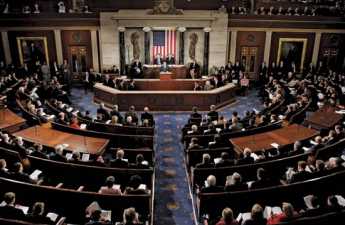
|
| Houses of Congress |
Partisan politics begins with vote-swapping, evolves into a system of concentrating the votes of the members into the hands of party leaders, and ultimately creates the potential for declaring betrayal if the member votes his own mind in defiance of the leader. The rules of the "body" are adopted within moments of the first opening gavel, but they took centuries to evolve and will only significantly change direction on those few occasions when newcomers overpower the old-timers, and only then if some rebel among the old timers takes the considerable trouble to help organize them. In the vast majority of cases, after adoption, the opportunity to change the rules is then effectively lost for two years. Even the Senate, with six-year staggered terms, has argued that it is a "continuing body" and need not reconsider its rules except in the face of a serious uprising on some particular point. Both houses of Congress place great weight on seniority, for the very good purpose of training unfamiliar newcomers in obscure topics, and for the very bad purpose of concentrating power in "safe" districts where party leaders are able to exercise iron control of the nominating process. Those invisible bosses back home in the district, able to control nominations in safe districts, are the real powers in Congress. They indirectly control the offices and chairmanships which accumulate seniority in Congress; anyone who desires to control Congress must control the local political bosses, few of whom ever stand for election to any office if they can avoid it. In most states, the number of safe districts is a function of controlling the gerrymandering process, which takes place every ten years after a census. Therefore, in most states, it is possible to predict the politics of the whole state for a decade, by merely knowing the outcome of the redistricting. The rules for selecting members of the redistricting committee in the state legislatures are quite arcane and almost unbelievably subtle. An inquiring newsman who tries to compile a fifty-state table of the redistricting rules would spend several months doing it, and miss the essential points in a significant number of cases. The newspapers who attempt to pry out the facts of gerrymandering are easily gulled into the misleading belief that a good district is one which is round and compact, leading to a front-page picture showing all districts to be the same physical size. In fact, a good district is one where both parties have a reasonable chance to win, depending for a change, on the quality of their nominee.
So that's how the "Will of Congress" is supposed to work, but the process recently has been far less commendable, and in fact, calls into dispute the whole idea of a balance of power between the three branches of government. We here concentrate on the Health Reform Bill ("Obamacare") and the Financial Reform Bill ("Dodd-Frank"), which send the same procedural message even though they differ widely in their central topic. At the moment, neither of these important pieces of legislation has been fully subject to judicial review, so the U.S. Supreme Court has not yet encumbered itself with stare decisis of its own creation.
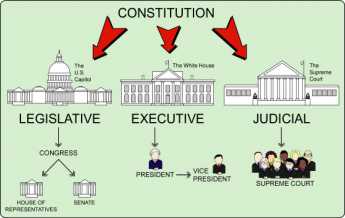
|
| Three branches of government |
In both cases, bills of several thousand pages each were first written by persons who if not unknown, are largely unidentified. It is thus not yet possible to determine whether the authors were affiliated with the Executive Branch or the Legislative one; it is not even possible to be sure they were either elected or appointed to their positions. From all appearances, however, they met and organized their work fairly exclusively within the oversight of the Executive Branch. Some weighty members of the majority party in Congress must have had some involvement, but it seems a near certainty that no members of the minority party were included, and even comparatively few members of highly contested districts, the so-called "Blue Dogs" of the majority party. It seems safe to conjecture that a substantial number either represent special interest affiliates or else party faithful from safe districts with seniority. The construction of the massive legislation was conducted in such secrecy that even the sympathetic members of the press were excluded, and it would not be surprising to learn that no person alive had read the whole bill carefully before it was "sent" to Congress. It's fair to surmise that no member of Congress except a few limited members of the power elite of the majority party were allowed to read more than scattered fragments of the pending legislation in time to make meaningful changes.
The next step was probably more carefully managed. No matter who wrote it or what it said, a majority of the relevant committees of both houses of Congress had to sign their names as responsible for approving it. Because of the relatively new phenomenon of live national televising of committee procedure, the nation was treated to the sight of congressmen of both parties howling that they were only given a single day to read several thousand pages of previously secret material -- before being forced to sign approval of it by application of unmentioned pressures enabled by the rules of "the body". When party members in contested districts protested that they would be dis-elected for doing so, it does not take much imagination to surmise that they were offered various appointive offices within the bureaucracy as a consolation. As it turned out, the legislation was only passed narrowly on a straight-party vote, so there can be a considerable possibility of its likely failure if the corruptions of politics had been set aside, with members voting on the merits. Nevertheless, since this degree of political hammering did result in a straight-party vote, it leaves the minority party free to overturn the legislation when it can. The prospect of preventing an overturn in succeeding congresses seems to be premised on "fixing" flaws in the legislation through the issuance of regulations before elections can open the way to overturn of the underlying authorization. Legislative overturn, however, is very likely to encounter filibuster in the Senate, which presently requires 40 votes. Even that conventional pathway is booby-trapped in the case of the Dodd-Frank Law. The Economist magazine of London assigned a reporter to read the entire act, and relates that almost every page of it mandates that the Executive Branch ("The Secretary shall") must take rather vague instructions to write regulations five or ten times as long as the Congressional authorization, giving the specifics of the law. The prospect looms of vast numbers of regulations with the force of law but written by the executive branch, emerging long after the Supreme Court considers the central points, years after the authorizing congressmen have had a chance to read it, and well after the public has rendered final judgment with a presidential election. The underlying principle of this legislation is the hope that it will later seem too disruptive to change a law, even though most of it was never considered by the public or its representatives.
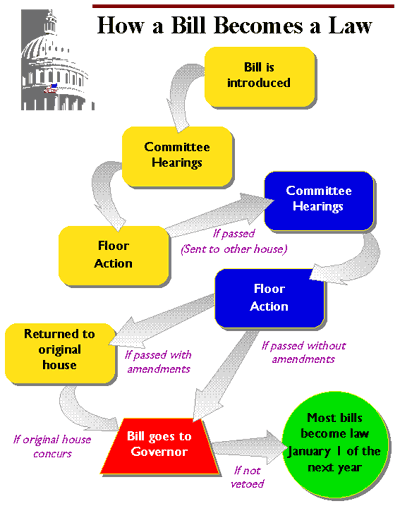
|
| Bill become a Law |
The "regulatory process" takes place entirely within the Executive branch. Congress passes what it terms "enabling" legislation, containing language to the effect that the Cabinet Secretary shall investigate as needed, decide as needed, and implement as needed, such regulations as shall be needed to carry out the "Will" of Congress. Since the regulations for two-thousand-page bills will almost certainly run to twenty thousand pages of regulations with the force of law, the enabling committee of Congress will be confronted with an impossible task of oversight, and thus will offer few objections. The Appropriations Committees of Congress, on the other hand, are charged with reviewing every government program every year and have the power to throttle what they disapprove of, by the simple mechanism of cutting off the program's funds. Members of the coveted Appropriations Committees are appointed by seniority, come from safe districts, and are attracted to the work by the associated ability to bestow plums on their home districts. By the nature of their appointment process, unworried by the folks back home but entirely beholden to the party bosses, they have the latitude to throttle anything the leadership of their party wants to throttle badly enough. The outcome of such take-no-prisoners warfare is not likely to improve the welfare of the nation, and therefore it is rare that partisan politics are allowed to go so far.
The three branches of government have become unbalanced. These bills were almost entirely written outside of the Legislative branch, and the ensuing regulations will be written in the Executive branch. The founding fathers certainly never envisioned that sweeping modification will be made in the medical industry and the financial industry, against the wishes of these industries, and in any event without convincing proof that the public is in favor. This is what is fundamentally wrong about taking such important decisions out of the hands of Congress; it threatens to put the public at odds with its government.
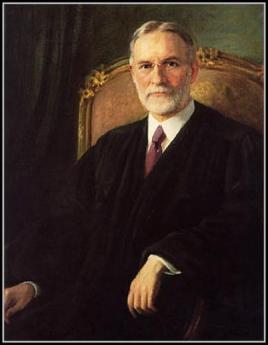
|
| Justice George Sutherland |
There is no need to go further than this, harsher words will only inflame the reaction further than necessary to justify a pull-back. And yet, the Supreme Court would do us mercy if it doused these flames; the Supreme Court needs a legal pretext. May we suggest that Justice George Sutherland, who sat on the court seventy years ago, may have sensed the direction of things, short of using a particular word. Justice Sutherland recognized that although it is impractical to waver from the principle that ignorance of the law is no excuse, it is entirely possible for a person of ordinary understanding to read law in its entirety and still be confused as to its intent. He thus created a legal principle that a law may be void if it is too vague to be understood. In particular, a common criminal may be even less able to make a serious analysis. Therefore, at least in criminal cases, a lawyer may well be void for vagueness. In this case, we are not speaking of criminals as defendants or civil cases of alleged damage of one party by a defendant. Here, it is the law itself which gives offense by its vagueness, and Congress which created the vagueness is the defendant. Since we have just gone to considerable length to describe the manner in which Congress is possibly the main victim, this situation may be one of the few remaining ones where a Court of Equity is needed. That is, an obvious wrong needs to be corrected, but no statute seems to cover the matter. The Supreme Court might give some thought to convening itself as a special Court of Equity, on the special point of whether this legislation is void for vagueness.
We indicated earlier that one word was missing in this bill of particulars. That would be needed, to expand the charge to void for intentional vagueness, an assessment which is unflinchingly direct. It suggests that somewhere in at least this year's contentious processes, either the Executive Branch or the officers of the congressional majority party, or both, intended to achieve the latitude of imprecision, that is, to do as it pleased. Anyone who supposes the general run of congressmen voluntarily surrendered such latitude in the Health and Finance legislation, has not been watching much television. Given the present vast quantity of annually proposed legislation, roughly 25,000 bills each session, the passage of a small amount of vague legislation might only justify voiding individual laws, whereas an undue amount of it might additionally justify a reprimand. However, engineering laws which are deliberately vague might rise to the level of impeachment.
Addressing the Flaws of Republics
EVERYONE might profit from reading Plato on the subject of republics, not to mention reading James Madison. Both The Republic and The Federalist were conjuring republics they proposed, not ones they had experienced. After Madison did get the hands-on experience he had such radical changes of opinion his friend George Washington essentially never spoke to him again. Not only in republics, of course, does reality prove different from founding theory. It might seem more measured to say of republics that two centuries of their reality proves to be such an extension of theory, it effectively departs from it. In essence, the Republican idea is to limit the voters to one periodic review of their representative's term of office overall, not in ongoing picky detail which would hamper him. This definition contrasts republics with democracies and implies the reason to favor republics. The elected representative is given full power to act during his term in office, but must eventually face the voters for accounting at the fixed time for re-election. Plato and Madison were right about extending latitude to one's chosen representative, but they failed to predict how effectively that latitude might be stolen by the legislative body itself and controlled by rules and leadership which skirt ratification by the general public outside their chamber, in any district. The Romans, of course, did know what they were talking about, but history has tended to ascribe Roman difficulties -- assassinations, for example -- to flaws in Roman character rather than in the construction of the Roman Republic. After describing some problems history has revealed about our own system, this essay is written to propose a solution. A second essay follows, to defend that solution.
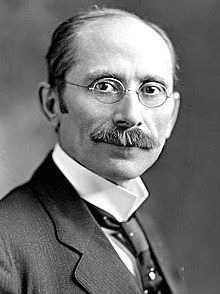
|
| Joseph L Bristow |
The differences between House and Senate in the original U.S. Constitution were three, but since the Seventeenth Amendment in 1913, there are now only two. Originally, Senators were selected by the states they came from, mostly by the legislatures. A century of experience demonstrated the result was cronyism, members of the legislature using senatorial appointments as bargaining chips and for the most part limiting the choice to one of their own members. The provision probably did attract a higher grade of legislator overall, encouraging those primarily ambitious to be U.S. senators to have a try-out in the minor leagues first. It did give the State government serious power to punish a U.S. senator who failed to please the home state. And this selection process made it simpler and cheaper to run for the job as U.S. senator. This feature encouraged candidates with competing for career choices, otherwise discouraged by the expense and unpleasantness of candidacy, to step forward. But by 1913 all this was seen as a way for cronyism to dominate the process, swapping appointments for favors, or even more tangible bribes. From the distance of another century, it can be seen that the steadily declining power of state legislatures was matched by a declining quality of their elected membership, leading to a rising level of sordidness in their foibles. Hapless amateurs were largely supplanted by career politicians. After the Civil War "states rights" stirred up memories of secession and led to a deliberate weakening of the states' role. Whatever the reasoning, the mentality of Progressivism was sweeping the country in 1913, and popular election of senators was deemed a Good Thing, swept into general satisfaction. Doubt about whether it all made as much difference as claimed lies in the reality that from 1913 to 2010, one quarter (182) of all Senators have first arrived in the Senate through appointment by a Governor to fill an unexpired vacancy. Many of these vacancies have of course been contrived for the purpose.
The relative power of a senator and a representative lies in the size of the population who vote for them, and the frequency with which they must endure that unpleasantness. Members of the House are elected for two years and members of the Senate are elected for six; the voting constituency of 100 Senators is generally much larger than that of 532 Representatives, so because the population grows faster than the number of states, the representation discrepancy also grows. The frequency of running for reelection seems to be so irksome that whenever a Senate seat falls vacant, some sitting Congressman from that state is almost certain to try to switch. Of course, it is true that with only a quarter as many senators as congressmen, the power of each vote is weightier. To the extent that committee memberships represent special insider power, a senator does belong to more committees but is more severely stretched to attend them all. Each senator's vote does have a greater scarcity value, but a Representative who tends to business is more likely to know what he is talking about, hence better able to be influential in the committees where most matters are really decided. The limits of merit promotion in both houses of Congress lie in the differing power of various committees, while the favor of appointment remains within the iron control of caucus leadership. In public, senators seem generally more polished and experienced in public persuasion. The persuasion that counts, however, is of gaining the respect of colleagues in your own legislative body, always restrained by the power of leadership to coerce conformity. Public persuasiveness, by contrast, is often little more than glibness, reflecting greater experience with dodging an issue to conceal a lack of depth in it. Almost all senators aspire to the presidency, although few achieve it. No Congressman has been elected President since Warren Harding; indeed, few Congressmen even dare to seek the nomination. The appointment of Gerald Ford was a special situation. However, it is worth pondering that during the early days of the republic, the House of Representatives was considered much more prestigious than the Senate, and that curiosity continues to raise an important question just why it is now reversed.

|
| George Washington |
The differences in prestige between the House and the Senate cannot be ascribed to the comparatively minor differences in their Constitutional definition, the size of their district and the frequency of election. Otherwise, we could immediately improve the quality of congressmen by reducing the limit of their number and frequency of re-election, which scarcely anyone has proposed. The more likely source of the problem can be found in the differing rules of procedure which each body has adopted; and reaffirms at the opening of each term. Various strategies of committee assignment and seniority have adapted to the reality that newly elected politicians rarely have any skills other than the ability to get elected. But almost everyone can learn, given enough time being exposed to a topic. A seniority system can occasionally lead to someone who is hopeless, gradually floating into a position where he can do great harm. Provision must be made for graceful exceptions to the seniority rule, usually by excluding a member from important committees until he has demonstrated some competence, less often by later dropping someone who has age- or alcohol-diminished faculties. Underlying this approach is a contempt bred of experience for the wisdom of the voters, back there in the district, whereas the leaders of the fraternity can protect the nation by judiciously devised rules. Sometimes it is, unfortunately, necessary to be a little hard boiled.
So far so good. When Jefferson and Martin Van Buren invented political parties, the bodies of Congress responded by inventing caucuses. George Washington was not a learned man, but he knew he hated this system. James Madison probably feared political parties more than he hated them, so he incurred Washington's permanent displeasure by getting good at manipulating what he saw as the winning strategy. Van Buren's fate was more ironic; after inventing many of the unpleasant little strategies of modern politics, he was defeated by William Henry Harrison in the "log cabin" election of 1840. Harrison hadn't been born in a log cabin at all, he was born in a Virginia mansion, hee, hee, hee. George Washington wouldn't have chuckled at that one, he would have been livid.
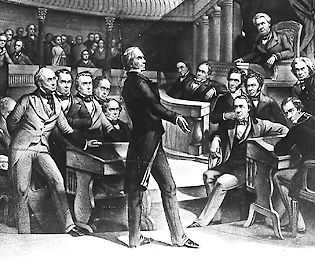
|
| Henry Clay |
Party caucuses have only one central feature, which is vote-swapping. Many of the strategies of this unattractive behavior were outlined in elegant detail by Pliny the Younger, in the Roman Senate, and James Madison the student of government had sought to avoid them. When he decided it was hopeless, he joined them and got good at it. In retrospect, the premier example of vote-swapping was the trade which Madison and Hamilton made, placing the nation's capital in Virginia/Maryland instead of Philadelphia, in return for federally redeeming the Revolutionary debts for all 13 states, when Virginians had already paid theirs off. Philadelphia had essentially nothing to say about it. Pliny had cautioned and subsequent practitioners have followed the advice to cover your tracks by swapping votes for an issue seemingly unrelated to the one in dispute. That's about all there is to vote-swapping, find out what the guy wants badly enough, and trade him something for it. It follows that it's wise to give off the appearance that you don't want much of anything. A corollary is that political caucuses try to conduct even innocent or public-spirited discussions in secret, making public only what is expedient to be made public. And a further corollary: some members of a caucus are from totally "safe" districts. Occasionally their votes can safely be traded for something the opposing party wants but the caucus feels necessary to claim to oppose. When a caucus wants something badly enough to trade it for something else but is three or four votes short, the opposing caucus may trade the four votes from safe districts while violently denouncing the dirty turncoats. All this is known as party loyalty. When things are particularly tough, party loyalty can be enforced by finding out what you want badly and taking it away from you. When these whips are applied to you, a grievance develops. Fine, what do you want to trade in return for vengeance? Many of these refinements seem to come, not from Rome, but from Sicily.
As was stated at the beginning, the purpose of this essay is not to rail at Congressional corruption, but to counteract it to some degree. Since the worst features of this system require secrecy and public duplicity to be effective, the best remedy is sunshine. Not about what Roosevelt did in his third term, but about what your local congressman might do next week, and his fear you will find out. His fear that a blogger will tip off the local newspaper or radio station, encouraging someone else with the ambition to file for election against you. And his fear that when he asks someone for a campaign contribution, that person will bring up the topic in question. His fear that the local political boss will decide he can't win.
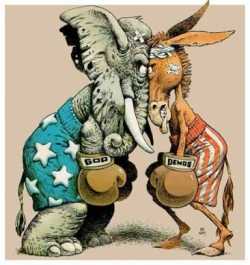
|
| Boxing Politicians |
This was more or less the system which the founding fathers, James Madison chief among them, envisioned for this shining city on a hill. And which two centuries of rather clever schemers have gradually eroded. The highly desirable feature of a republic is that the elected person is free to represent his own interpretation of what is best for his district or, failing that, what is best for the nation. The elected representative is encouraged to risk defeat in the next election, if in his judgment what is good for the district is bad for the nation. But he is not a suicide bomber if his vote will make little difference in the outcome he can be forgiven for taking cover. One would wish that fewer of them would speak one way and vote in the opposite direction, but that can be forgiven if someone back home in the district is keeping score and letting others know of it. The fundamental principle of a republic as distinguished from a pure democracy is that a representative, while free to act during his term in office, remains obliged to face the voters at the appointed time. Our system has come to exaggerate the actual extent of freedom to use judgment because the freedom has been stolen by party leaders through the application of schemes too devious to detail. But freedom is fundamentally a good thing. What has come to be so lacking is the idea of facing an informed electorate in making a choice between you and an informed opponent. The public, it must be feared, doesn't know beans.
And so the proposal for fixing this mess is difficult, but it can be stated simply. The recent economic boom created nearly a thousand billionaires; maybe four hundred would be a number that would escape challenge. If only fifty of them would endow think tanks in all fifty state capitals, and the fifty-first would endow an organization dedicated to making their research available to the public, then perhaps another fifty would be prompted to create a second think tank in each state capital on the opposite political side. Two polarized think tanks in each state capital, just imagine it. As things now stand, it would be a sufficient first step if that happened in only one state, and the rest of the country could watch what happens.
South Philadelphia: Ideal Intermodality Transportation Site
The Right Angle Club was recently visited by Troy Adams, representing the Greater Philadelphia affiliate of the regional Chamber of Commerce. Sustained by contributions from sixty local corporations, the Greater Philadelphia organization is a major storehouse of data useful for businesses, supported by a staff of analysts and computer experts. The purpose of this institution is to help businesses who are trying to decide whether or how to locate in the Philadelphia region. With such an organization behind him, Mr. Adams was able to show a number of slides displaying the demography, geography, and statistics about our region, and his appearance is greatly appreciated. This is definitely the place to go if you have questions of that sort. It would probably also be a good place to go for opinions and gossip about the politics and inside baseball of the town, but the Chamber has a strict rule about avoiding any involvement in business moving from one district to another within the region or hearsay that might lead to such internal friction.
One really important insight into the potential of our region concerns South Philadelphia. Historically, this was the place where the Schuylkill and Delaware Rivers met, and was once a very big swamp (wetland, nature sanctuary or whatever). Over time, the swamp became a trash and garbage landfill, and over still more time it became a big flat uninhabited area right next to a big city. But then an Interstate Highway (I95) was built on its circumference, and several rail lines, and an international airport, not to mention extensive port and shipping terminals for ocean transport. While it is true that a certain number of houses would have to be purchased and demolished to accomplish it, the potential exists for the construction of an intermodal interconnection which would be almost unique in the world.

|
| South Philadelphia Ports |
There would be plenty of lands left over for industries related to freight forwarding and the like (the food distribution center is a good example of the general concept), and all of this would be within twenty minutes of the center of a major city. SEPTA already sends a passenger rail spur from the very heart of the city to the very center of the airport, and there is no reason it could not be extended to include ocean, bus, and distribution terminals. Whether this exactly fits with the extensive sports stadium complex in the area is unclear, but these entertainment features are doing no harm to the intermodal interchange idea in the meantime. Judging by the city government's willingness to tear these structures down every five or ten years, there should be no great resistance to moving them elsewhere if the need should arise.
Future Directions for Book Authoring

|
| TSR-80/100 |
Here's some advice for new authors of books: You can't write the first chapter until you have written the last chapter. That is, you have to hit the reader between the eyes in the first chapter, draw him into the argument, making a pauseless transition from a general statement of the author's thesis into a relentless march of evidence toward the conclusion. This general design comes easier with practice and is therefore much harder for beginners to accomplish. But even experienced authors are usually unable to keep the overall design of their message constantly in mind, to be able to sit down and write the book straight through from beginning to end. It's true that Sir Walter Scott was said to turn over the last page of a book, and immediately begin writing the first page of the next one without getting up from his desk. But we aren't talking about pot-boilers, we're talking about serious books. That includes almost all non-fiction and the great majority of serious fiction.
As a matter of fact, the description includes the majority of short articles as well; newspaper editorials would be a good example. Although the style of an editorial is to start with a generality, marshal a description of some recent events, and end up with a short summary, that isn't in fact how it is usually composed. The editorial writer starts with a one-liner, or call to action, organizes some recent events and some historical arguments as a reason to issue such a call, and then ends up by summarizing things in the first paragraph. Having mentally designed the editorial into such a three-step pattern, with experience a professional editorialist can sit down and write the editorial from beginning to end and, after a few touch-ups, it's ready for the printer. He really has gone through the organizational process which a book author needs to go through, but the article is short enough so that reconstruction is performed in his head. In a book, it is generally necessary to write out the chapters in a jumbled way, and later re-organize them. A new author with his first manuscript generally doesn't adequately appreciate the truth of this and has to be muscled by the editor, at least just a little bit. One of my editors summarized his job as follows: you tell every new author to take the first four chapters of his book and throw them away,
That's cruel, of course, and is seldom accepted graciously. The brusqueness is justified by understanding that the fresh new author thinks he's all finished when he isn't. He's silently telling himself he means to tell that editor, "Don't you touch a single comma of it." In the old days, authors were rare and had to be coddled. Book publishers in the Eighteenth century purchased the manuscript in its entirety, either then losing money or making a huge fortune, but leaving the author with only his manuscript price. At that time, publishers called themselves booksellers. As things evolved, booksellers often had to support a starving author while the book was being written, offering an "advance" payment to be deducted from royalties paid after final sales to readers. Author royalties were about ten percent of sales. The royalty system persists today, but advance payments are uncommon and negotiated around the tax code effects. All of these payment evolutions reflect the underlying issue: good authors used to be rare, but now are frequent. Book publishers used to be wealthy, but now are rapidly going bankrupt and extinct. Authors of excellent books have a hard time finding someone to publish them. The advent of the personal computer around 1980 is what caused this.
In 1980 I published a book, writing it on my brand-new Radio Shack TRS-80, Mod I. The editor of the publishing house had never heard of such a notion, scoffed at it, and declared he would never touch such a thing as a computer. In 2010 there were more than 800 million personal computers manufactured and sold, and by this time almost no publisher will accept a manuscript without an accompanying magnetic disc to make revisions cheap and easy, and to shift the costs of key-entry from the publisher to the author. At first, manuscripts were shipped to India for key entry. Now, it is the diskette which is mailed or e-mailed to India, and the editor is often located in India. We are soon approaching a day when the keyboard and author remain at home, sending material to gigantic server computers in China, from which the editor anywhere in the world can retrieve the material and revise it, returning the material to the server computer where the author can comment on the revisions without moving from his desk. After that stage, looms the prospect of the reader paying a fee on his credit card to access the "book" directly from the server, and reading it at home. At that point maybe the book will have been completed, and maybe it will be revised some more. In a sense, a book will never be definitely finished and allowing the public to read it will only be an episode within an unending process of revision. Newspapers, magazines, and books are all struggling to find a way to cope with this unpredictable evolution. Like most revolutions, this one doesn't have a clear idea where it is going.
So let's reflect back on the central process of authoring. In addition to the old maxims of the trade, there is the Euclidian reality that you can't write the last chapter until you somehow write a first one. The original first chapter, the one the author struggled so hard to compose, is destined to be cast off and replaced by a new first one, one that succinctly announces what is about to be said. After that must come a new second chapter, which takes the reader from the initial disconcerting summary back to the origins of the problem now about to be clarified. Followed by a third chapter, probably one shifted forward from the assorted chapters of evidence back into prominence as the key piece of evidence which leads to other confirmatory pieces of evidence; after that marches the parade of confirmatory evidence, ending with one zinger of a conclusion.
Voltaire or some other cynic would probably comment that what has here been outlined is merely an elaborated process of what editorial writers do: start with the conclusion and find slanted facts to fit it. Some may indeed do that. But there is some hope that the inevitable impact of technology on authorship can bring us to a system where many authors will assemble the facts, and only then derive a conclusion from them. If politicians would only adopt that system, maybe we could hope for a perfect world.
Locating Corporate Headquarters

|
| Troy Adams |
The Right Angle Club was recently entertained by a director of the Greater Philadelphia movement, Troy Adams. One of their main purposes of spending several millions of dollars annually is to try to attract new businesses to Philadelphia. The money, interestingly enough, is contributed by other businesses, many of whom would be competitors of the newly attracted ones. What's the value of this? How do you go about doing it, even if it is a splendid idea?
From the viewpoint of the city government, attracting new businesses means attracting new sources of taxation. It is not surprising therefore that the Chamber of Commerce tends to believe the main obstacle to attracting new business relocations is the tax structure of the locality. That's what the officers of companies under investigation ask about. By and large, the unattractiveness of Philadelphia to such inquiry is not the size of taxes, but their complexity. New businesses are turned off by learning of new types of taxes they had never heard of. It raises suspicion, and existing local businesses are quick to confirm that some of these strange-sounding taxes are objectionable mainly because you forget about them, and then get fined for not submitting a form to pay a small amount. If you get summoned to a hearing, it is even worse than paying the bloody thing. We have, say a lot of companies, branches in dozens of different cities, and we never heard of a tax like that. Of course, a famous sage once remarked that when someone complains it isn't the cost, it's the principle of the thing, well, it's the cost.
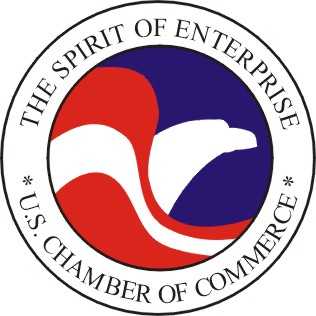
|
| Chamber of Commerce |
Regulations, requirements, prohibitions, deadlines, reporting requirements and all of that drive you crazy when you are trying to run a business. The cost of the taxes to a businessman is a simple question: do my competitors have to pay the same amount? If it's a level playing field, businesses ordinarily don't care about the money, since they can just raise the prices to the customer to cover it. Businesses, dear friends, don't look at costs the way the rest of us do. For that reason extended a little, businesses are strongly repelled by the existence of corruption, because corruption may or may not be applied equally, on a level playing field.
All of this sounded quite plausible to the Right Anglers until Buck Scott spoke up. " I beg to disagree, " he said. He remarked that in his experience the decision to move corporate headquarters to a city is determined by one person, or at most four. Whether the decision-maker is the CEO, a big stockholder, or a flunky assigned the task, the decision is usually not made on sensible economic grounds. It is based on the fact that the wife of the decision-maker grew up in Radnor or Chestnut Hill, and likes it here. If you are looking for access to ocean ports, railheads, Interstate Highways, airports, or proximity to big-city labor pools, Philadelphia has everybody beat. That sort of stuff is a given, and so what matters is that the decision maker wants to live here. To a certain extent, our proximity to New York and the District of Columbia is a handicap, since the lady of the family can live here while the corporate headquarters is not too far away, although too far away to be taxed. Buck Scott brought the discussion to a halt because it was obvious to everyone that he had a strong point.
.jpg)
|
| Philadelphia Ports |
On another level, however, there is still debate. The question is whether Philadelphia gains a great deal by having the corporate headquarters located here. The CEO may have invisible value by his socializing frequently with the CEOs of other corporations, but no one was able to defend that as having serious advantages. Since the competitive corporations are paying for this effort to attract new corporate headquarters to the region, there may well be advantages to them which are not immediately evident. What's clearly of value is locating large numbers of employees to the region, since they do generate business activity and hence taxes. Upscale companies have employees who are anxious to find good local schools, crime-free areas in which to live, and an improved environment; getting more of them into our voting pool will result in a better city, without question. Maybe, just maybe, locating the corporate headquarters in the region is a first step in enticing the rest of the company to come here. But it has not yet been demonstrated. Quite possibly, enticing the wives of decision makers to join the social whirl is the first step, and locating the factory here is only a secondary one which follows. Somehow, it begins to seem likely that the people who can influence one step, aren't talking to the people who determine the other.
Lowering the Taxes on Corporations
In the early years of the 21st Century, Ireland lowered taxes on corporate profits to a 12.5% rate, far lower than neighboring countries. Whatever else it did, it promptly encouraged corporations in Germany, Denmark, the United Kingdom, and other neighbors -- to move headquarters to Ireland where taxes were so low. Ireland is primarily rural, and a housing shortage developed in the cities as workers migrated to take advantage of the new jobs. Home prices went through the roof, mortgage applications overwhelmed local banks, who promptly re-sold mortgages to foreign banks. Sound familiar? It caused a housing bubble and then a horrendous international financial crisis. The European Union is financially and politically strained by the consequences and threatened to break apart over it.
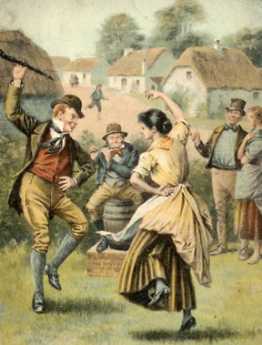
|
| Irish Jig |
That sounds pretty bad and should be a lesson to others. What Canada and a number of the individual United States got out of it was mainly this: if you lower corporation taxes, it causes prosperity. And so it might if politicians would do it gradually and moderately. Gradually and moderately are unfamiliar words in politics. Furthermore, there has long been a fundamental unfairness in taxing corporate profits twice -- once when the profits are made, and a second time when dividends are paid to shareholders. But it is obviously dangerous business, particularly when the governments involved are inexperienced. Canadians started talking about lowering their taxes to 16.5%, and no one could say whether that is a safe level or not. Within weeks, twenty-nine states with Republican governors were sending up trial balloons about joining this movement, and Governor Mitch Daniels of Indiana was much in demand as a consultant, and maybe a Presidential candidate, because Indiana had lowered corporate taxation some time ago, with favorable results.
This was exactly the sort of behavior James Madison had in mind when he designed the United States Constitution; it gave the people a way of disciplining overbearing state governments. Raise our taxes, and we will move. So there are strong arguments that these governors are approaching the right thing, and equally strong indications that everybody had better be plenty careful how this is approached.
The basic idea is good; double taxation should stop, and there is nothing in Madison's Constitution to prevent the Governors from doing what they say they would like to do. So how's this for a suggestion: if this movement gets started, let's take the opportunity to reduce all corporate income tax to zero. If everybody has the same zero rate, the incentive to migrate will disappear, and that's a good thing.
But if a major revenue source for the states disappears, what will take its place? At that moment of what would look like a crisis, it would be time for a national reconsideration and revision of the tax codes. And that would be an even more desirable outcome, provided it is done in an orderly and sensible way.
Adrift With The Living Constitution
.jpg)
|
| Senator Joe Sestak |
Former Congressman Joe Sestak visited the Franklin Inn Club recently, describing his experiences with the Tea Party movement. Since Senator Patrick Toomey, the man who defeated him in the 2010 election, is mostly a Libertarian, and Senator Arlen Specter who also lost has switched parties twice, all three candidates in the Pennsylvania senatorial election displayed major independence from party dominance, although in different ways. Ordinarily, gerrymandering and political machine politics result in a great many "safe" seats, where a representative or a Senator has more to fear from rivals in his own party than from his opposition in the other party; this year, things seem to be changing in our area. Pennsylvania is somehow in the vanguard of a major national shift in party politics, although it is unclear whether a third party is about to emerge, or whether the nature of the two party system is about to change in some other way.
For his part, Joe Sestak (formerly D. Representative from Delaware County) had won the Democratic senatorial nomination against the wishes of the party leaders, who had previously promised the nomination to incumbent Senator Specter in reward for Specter's switching from the Republican to Democratic party. For Vice-Admiral Sestak, USN (Ret.) it naturally stings a little that he won the nomination without leadership support, but still came reasonably close to winning the general election without much enthusiasm within his party. He clearly believes he would have beaten Toomey if the party leaders had supported him. It rather looks as though the Democratic party leadership would rather lose the election to the Republicans than lose control of nominations, which are their real source of power. Controlling nominations is largely a process of persuading unwelcome contenders to drop out of the contest. Sestak is, therefore, making a large number of thank-you visits after the election, and clearly has his ears open for signs of what the wandering electorate might think of his future candidacy.
America clearly prefers a two-party system to both the dictatorial tendencies of a one-party system, as well as to European multi-party arrangements, such as run-offs or coalitions. A two-party system blunts the edges of extreme partisanship, eventually moving toward moderate candidates in the middle, in order to win a winner-take-all election. Therefore, our winner-take-all rules are the enforcement mechanism for a two-party system. Our deals and bargains are made in advance of the election, where the public can express an opinion. In multi-party systems, the deals are made after the election where the public can't see what's going on, and such arrangements are historically unstable, sometimes resulting in a victory by a minority fringe with violently unpopular policies. In our system, a new third-party mainly serves as a mechanism for breaking up one of the major parties, to reformulate it as a two-party system with different composition. Proportional representation is defended by European politicians as something which promotes "fairness". Unfortunately, it's pretty hard to find anything in politics anywhere which is sincerely devoted to fairness.
Going far back in history one of the great theorists of legislative politics was the Roman Senator Pliny the Younger, who wrote books in Latin about how to manipulate a voting system. For him, parties were only temporary working arrangements about individual issues, a situation where he recommended: "insincere voting" as a method for winning a vote even if you lacked a majority in favor of it. Over the centuries, other forms of party coalitions have emerged in nations attempting to make democracy workable. Indeed, a "republic" itself can be seen as a mechanism devised for retaining popular control in an electorate grown too large for the chaos and unworkability of pure town hall democracy. A republic is a democracy which has been somewhat modified to make it workable. Our founding fathers knew this from personal experience, and never really considered pure democracy even in the Eighteenth century.
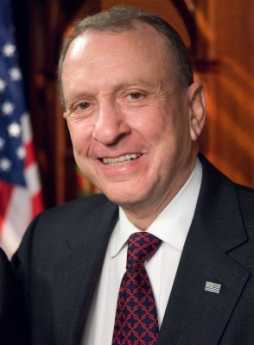
|
| Senator Specter |
The two main actors in shaping the American Republic were George Washington and James Madison. Madison was young, scholarly and largely unknown; Washington was old, famous, and insecure about his lack of academic political education. Both of them knew very well that if Washington really wanted something he was going to have it; what mainly restrained him was fear of looking foolish. But he hated partisanship and conniving, partly as a result of having been the victim of General Mifflin and the Conway Cabal. Washington hated political parties and anything resembling them; Madison was young and uncertain, and briefly surrendered the point. It took about two years of real-life governing for Madison to conclude that political parties were absolutely essential to getting something accomplished. In this, he experienced for the first time those unwelcome "pressures from the home state", with Thomas Jefferson determined to thwart Alexander Hamilton, and Patrick Henry thundering and denouncing any hesitation in going for the jugular vein of opponents. Madison was deeply concerned with making his new nation success and eventually joined Jefferson in the Virginia policy of opposing banks, cities and manufacturing. When Washington saw that Madison was committed to this course, he never spoke to him again. For Washington, honesty was always the best policy, and personal honor is never regained once it is lost. The compromise of 1790 was particularly vexing to their relationship, when Washington's honor and personal finances were used as bargaining chips for moving the nation's capital opposite Mount Vernon on the Potomac River, in return for placating Hamilton and Robert Morris with the assumption of state revolutionary war debts.
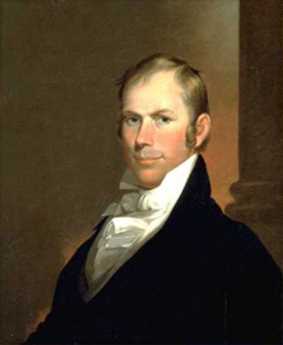
|
| Henry Clay 1811 |
Legislative partisan politics took a violent turn in 1811 when 34-year old Henry Clay was elected to his first term as a member of the House of Representatives. The Senate was less prestigious than the House in those days, and Clay had spent his time as a senator studying the landscape of the House before he made his big move upward. Up until that moment, the role of Speaker was that of mediator and administrator of the rules, partisanship was considered a shameful thing in a Speaker. Young Clay was elected Speaker on the first day of the first session after he moved to the House as a member. Seniority was brushed aside, and this newcomer took over. It takes only a moment's reflection to surmise that a lot of politics had taken place before the House convened. Not only that, but Clay immediately added the power of the Speaker to appoint committee chairmen, to the invisible powers of majority leader. The office of majority leader had not yet been created, but it was not long in emerging that anyone who could assemble enough votes for Speaker was also able to make highly partisan choices for Committee Chairs. Eventually, the seniority system was imposed in part as a reaction to perceived abuses of Speaker power. It is worth a digression to reflect on the role of any seniority system, which as it is clearly seen in labor-management industrial relations, serves to deprive management of promotion power, usually substituting seniority for selection by merit. In the case of the Speaker, the seniority system catapults the power of the Speaker over that of every member of his caucus. To rise in a seniority system for committee chairmen, a member must first be appointed to a desirable committee -- by the Speaker, or by his instructed favorites on the appointment committee. It puts in the hands of the Speaker or his agents the power to humiliate a member by ignoring his seniority; the other members know immediately what that means. To understand the power of this threat, reflect on Woodrow Wilson's famous observation that "Congress in committee, is Congress at work."
Soon after Henry Clay made his dramatic moves, Martin van Buren extended the idea of partisan party politics to the actual election of Congressmen. Much of the hoopla and deceptiveness of subsequent campaigns was invented by Andrew Jackson's vice president. And that included their own deal, in which van Buren worked for Jackson's election in return for a promise that he would be the successor, President. After that came the election of 1848, in which William Henry Harrison was elected as a man born in a log cabin. When, in fact, he had been born in one of the largest mansions in Virginia. That had been approximately George Washington's residence description, too, but it is hard to see Old Stone Face lowering himself to accept any office unless it was offered unanimously.
Compare that with the campaign financing episode which created the urban political machine. The Philadelphia traction king Wm. L. Elkins was narrowly concerned with building streetcar lines along with his business associate P.A.B. Widener; Widener had been a city politician before he got into street cars. One or the other of these two approached the Mayor of Philadelphia with the complaint that it interfered with building streetcar lines to have to bribe every bartender on every street corner. So he made a proposal. It wasn't the money that bothered him, because he could just raise trolley fares to cover it, it was the protracted delays. So, how would it be if the trolley company just delivered a big lump-sum bribe to the mayor? That would give enormous political power to the party boss through the power to distribute or withhold the boodle to party workers. And it would save the trolley company lots of time, while not costing any more than the "retail graft" system. Since then, just about every urban political machine in the country has been largely financed through the macing of utilities.
The downward trend of serial modifications to the Philadelphia Constitution of 1787, should be clear enough without further illustration. If the Tea Parties aren't mad about it, they should be. More likely, however, they are mainly mad about the modern pinnacle of sly tinkerings, plainly displayed on TV during the enactment of the Obama Health Bill. The point was repeated for emphasis in the Dodd-Frank financial bill, in case it is ever claimed to have been accidental. In both cases, 2000 page bills were prepared out of sight and thrust before the Congress with orders to enact them in four hours. If that's a representative government, perhaps we ought to go back to having a King.
Nanoparticles: The Dwarfs are Coming

|
| Professor Shyamelendu Bose |
Professor Shyamelendu Bose of Drexel University recently addressed the Right Angle Club of Philadelphia about the astounding changes which take place when particles are made small enough, a new scientific field called nanotechnology. In one sense, the word "nano" comes from the Latin and Greek for "dwarf". In a modern scientific sense, the nano prefix indicates a billionth of something, as in a nanometer, which is a billionth of a meter. Or nanotubes, or nano calcium, or nano-anything you please. A nanometer is likely to be the dominant reference because it is around this width that particles begin to act strangely.

|
| Nanoparticles |
At this width, normally opaque copper particles become transparent, the cloth becomes stain-resistant, and bacteria begin to emit clothing odor. Because the retina is peculiarly sensitive to this wavelength, colors assume an unusual brilliance, as in the colors of a peacock's tail. The stable aluminum powder becomes combustible. Normally insoluble substances such as gold become soluble at this size, malleable metals become tough and dent-proof, and straight particles assume a curved shape. Damascus steel is unusually strong because of the induction of nanotubes of nanometer width, and the brilliance of ancient stain-glass colors is apparently created by repeated grinding of the colored particles.

|
| Richard Feynman of Cal Tech |
Practical exploitation of these properties has almost instantly transformed older technologies and suggests the underlying explanation for others. International trade in materials made with nanotechnology has grown from a few billion dollars a year to $2.6 trillion in a decade, particularly through remaking common articles of clothing which were easily bent or soiled, into those which are stain and water resistant. Scientists with an interest in computer chips almost immediately seized upon the idea, since many more transistors can be packed together in more powerful arrangements. Richard Feynman of Cal Tech seems to be acknowledged as the main leader of this whole astounding field, which promises to devise new methods of drug delivery to disease sites through rolling metal nanosheets into nanotubes, then filling the tubes with a drug for delivery to formerly unreachable sites. Or making nanowires into various shapes for the creation of nano prostheses.
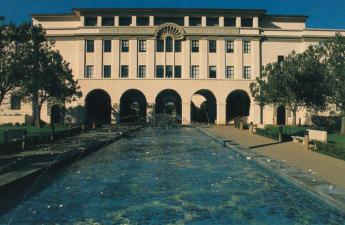
|
| Cal Tech on Los Angeles |
And on, and on. At the moment, the limitations of this field are the limitations only of imagination about what to do with it. For some reason, carbon is unusually subject to modification by nanotechnology. It brings to mind that the whole field of "organic" chemistry is based on the uniquenesses of the carbon atom, suggesting the two properties are the same or closely related. For a city with such a concentration of the chemical industry as Philadelphia has, it is especially exciting to contemplate the possibilities. And heartening to see Drexel take the lead in it. There has long been a concern that Drexel's emphasis on helping poor boys rise in the social scale has diverted its attention from helping the surrounding neighborhoods exploit the practical advances of science. The impact of Cal Tech on Los Angeles, or M.I.T on Boston, Carnegie Mellon on Pittsburgh, and the science triangle of Durham on North Carolina seems absent or attenuated in Philadelphia. We once let the whole computer industry get away from us by our lawyers diverting us into the patent-infringement industry, and that sad story has a hundred other parallels in Philadelphia industrial history. Let's see Drexel go for the gold cup in this one -- forget about basketball, please.
Children Playing With Matches

|
| Playing with Matches |
THERE are still a lot of people secretly re-fighting the Vietnam War, which in retrospect was rebellion against the draft and allegiance to the idea that America just doesn't start wars. But times change, and those who now suppose the secret sympathizers with the anti-draft movement will automatically join a second call to rebellious duty, are probably going to be disappointed with how conservative the baby boomers have become. The boomers find themselves parents, defending their own authority from attack by their children. As King Lear ruefully observed in the same reversed situation, let them feel how sharper than a serpent's tooth it is, to have a thankless child. We now define our present world problem as overleveraging, not compulsory military service, and estimate it may take as long as fifteen years to sort itself out -- until yet another judgmental generation comes over the hill behind the rebels. The aggregate debts of the European Union, using present-value calculations, are said to be three times as large as the Gross Domestic Product of Germany; now, that's really a problem. When you consider the only sure cure for excessive leverage is "growth", and that the code word of growth really means stuff wearing out, getting used up, and getting obsolete, it is not hard to see it taking 15 years to go away -- much more lasting than any draft dodger issue. When I go to restaurants they are crowded and expensive; people are living on their reserves, but there seem to be lots of reserves so this problem will last a long time.
But, four generations back, I can remember 1937 when there were no reserves, and plenty of homeless people actually froze to death. Plenty of people were then talking Communist who nowadays are talking McCarthyism, hoping no one notices the switch. I used to ride up and down the elevator of a hospital with Harry Gold, the thermonuclear spy no less. So what worries me about the present uproar is that it comes too soon, before very many people get really scared enough to do really stupid things, then recognize their folly.
I think it was Abbie Hoffman, not Jerry Rubin, who climbed up into the visitors' gallery of the New York Stock Exchange and threw handsful of dollar bills, salted with just a few hundred-dollar bills to bring trading to a halt. Big joke; just see who was scrambling on the floor. That's what the sixties seemed like to most of us; a big joke. But out at Kent State, some kids with crew cuts were information, under orders that at the last moment the gun barrels must come level -- and the live rounds slide home.
Bonds--Do They Have A Future?

|
| Relic of the Past? |
EVER since we finally went off the gold standard completely during the Nixon Administration, the Federal Reserve has adjusted our money supply to create a fairly steady 2% inflation. If inflation is ever less than 2%, the Fed puts more money into circulation. Since many bonds are paying less than a 2% dividend, everybody who buys and holds them at par will lose money in "real" terms. That is, everyone who buys bonds when they are issued and sells them when they mature will lose spending power. Since they fluctuate in the meantime, it is possible for a trader to buy them when they are undervalued by the market. That trader will possibly make money, but only because someone else lost money. Something like that occurred during the recent financial crash bailout, when interest rates declined from 3% to less than 2% but were repurchased by the Fed as "Quantitative Easing", effectively giving speculators a 33% profit at government expense. But that doesn't happen often, and just guess who ultimately lost the money the speculators made. There is also that daunting question: when the time comes for the Federal Reserve to disgorge them, just who is going to buy all these cheapened bonds? In Japan, bonds paid a dividend of less than the rate of inflation for more than a decade; it's hard to think of a reason why the same thing could not happen in America. So it's also hard to imagine a reason why buy-and-hold investors should not abandon bonds, perhaps suddenly all at once, at some unknown time in the future. At that point, many of them will resolve never to try that, again. The whole idea is troubling.
It's particularly troubling in view of the lack of success, so far, of TIPS. These vehicles are new; perhaps the algorithm is set to ignore minor inflation and will over-respond to more major inflation, ultimately rewarding those who buy them. But at least so far, they are a disappointment. Furthermore, TIPS are quite cleverly designed to be inflation-protected, while unfortunately inflation usually does not follow a straight line but is volatile, or saw-toothed; the jury is still out. The jury better hurry up, because all investors look for net income after expenses, which include brokerage costs, taxes, and inflation. A long-term bond might have to pay a dividend approaching 4%, just to emerge with the same net value it started with; after five years of 4%, you could be 20% behind. And yet, the bond market with or without inflation protection is far larger than the stock market and compares in size with all other kinds of market. Who buys them, especially in these huge quantities?
Somebody must maintain statistics which answer this question, but as a guess, the main buyers are insurance companies, endowments, annuities, hedge funds, banks. And foreigners, of course, to whom our follies seem trivial compared with their own. The great argument for bonds is the safety of principal, and although safety is in question anywhere there is inflation when the topic is cash flow, safety is definitely an issue. Cash shortages are what cause bankruptcies, which are mainly useful in providing time to liquidate underlying wealth to pay restless creditors. The management of a non-profit organization must meet its payroll out of cash flow, so non-profits protect themselves from dissolution by having a regular flow of nominally secure bond dividends. Income from donations and contributions can be particularly weak during times of economic stress. Since most for-profit organizations also experience variable periods of time without profits, their situation does not differ greatly from nonprofits. That's particularly true when a for-profit organization has a vocal, activist stockholder group, who will protest fiercely if the management retains abundant cash. For such a predicament, holding bonds creates safety by some definition. The price of that safety is the long-term average loss on the bond portfolio; the company's alternative losses are whatever it takes to maintain a stable work force during unstable times. The business school assessment of this tradeoff is that bond losses can usually be passed through to the customers as a business cost, while layoffs and strikes may not be.
To restate the characteristics of willing bond purchasers, they are governments and corporations who have no common stock issuance alternatives, but regularly face a need to have money available for payroll. They also include borrowers and lenders at nominal interest rates like banks and insurance companies, who can afford to ignore inflation because their own liabilities are in nominal dollars, or come due at a date certain. And then, there are a host of beneficiaries of special-interest bond provisions, like "Flower bonds", state and municipal governments, foreign aid, student aid, etc. As an overall statement, natural bond buyers are those who either do not possess steady equity (common stock) alternative to offer investors or else are shielded in some way from the inflation and tax costs of buying bonds. Speculators and traders are excluded from the discussion because fixed-income trading is a zero-sum game, something you should teach your children to avoid. Other than these special niche opportunities, bonds should be regarded by the ordinary investor as trading opportunities when interest rates get too high, which is roughly every fifteen years or so.
Things in the bond market were not always so bad; Robert Morris, Jr. was a genius for devising this market in 1784. But the equity market was then not so well developed, life expectancies were shorter, and a minimum 2% inflation was not guaranteed by the Federal Reserve. The income tax had not been invented. It was possible to enjoy the promised benefits of lending in those days, for decades or even lifetimes. It was much harder to find investments of superior performance, without getting involved in business management. Meanwhile, the bond market just got huger and huger. Modifying or dismantling it in logical ways would have enormous disruptive effects. So enormous, the Congress has just adopted the stance called "kicking the can down the road", which is a debt you never seriously intend to repay.
Are we waiting for the bond market, the bond vigilantes, or speculators to find some vital vulnerable flaw, and topple it all into the ashcan of history? Or is there some better plan that no one has mentioned?
What Is the Purpose of a National Constitution?

|
| 13th Century Magna Carta |
NATIONAL constitutions are mainly an outgrowth of the 18th Century Enlightenment, even though similar features are to be found among ancient legal codes. Those who trace the origins of the American constitution to the 13th Century Magna Carta will usually point to a central sentence of clause 39:
No free man shall be arrested, or imprisoned, or deprived of his property, or outlawed, or exiled, or in any way destroyed, nor shall we go against him or send against him, unless by legal judgement of his peers, or by the law of the land.
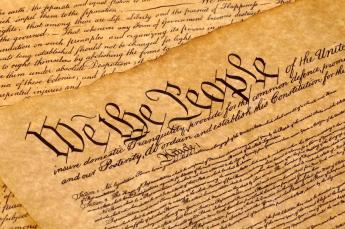
|
| American Constitution |
That's a pretty good beginning, a good example of a needed legal principle, but unrecognizable as what we would today call a Constitution. It states what a government may not do, but does not define the nature of a government which does the job best. Nor do even the many Enlightenment philosophers of government take that final step of outlining where their notions should take us until the American Constitution had been written and defended in the Federalist papers. Nowhere among the writings of Montesquieu (The Spirit of the Laws, 1748), Catherine the Great (Nakaz, Instructions to the All-Russian Legislative Commission, 1767), Diderot (Observations About Nakaz, 1774), James Madison (1787), John Dickinson(1763) or Gouverneur Morris(1787) can there be found much tightly described definition of a constitution. Certainly, there is no definition within the writings of Adam Smith if we look for rule-making among Enlightenment thinkers whose ideas were influential on the 1787 Philadelphia document. The American constitution was the product of many minds, before and after 1787. The outlines of its final form converged, and emerged, from the Constitutional Convention of the summer of 1787, with Gouverneur Morris as the penman of record. To him, we certainly owe its succinctness, which is the main source of affection for the document. That probably understates matters; in his diary of the secret meetings, James Madison records that Gouverneur Morris rose to speak about 170 times, more than any other delegate. Lots of thought and debate; ultimately, few words.
The Elizabethan Sir Francis Bacon has the greatest claim on devising a theory of law and law-making in the Anglosphere tradition. But his elegant modification of Galileo's scientific method, the English Common Law, is more a methodology for creating good laws than an outline of a nation's legal principles. Anyway, tracing the American Constitution back to an underlying British one tends to stumble when the British Constitution fails to meet a definition which would include our own. The British Constitution is said to be "unwritten" to the degree it is a consensus of revered documents. It can be amended by Parliament at will, has a variable history of defining just who is covered by it, and in order to define constitutional principles seems to rely on sentences extracted from difficult context. If the two constitutions had been written and compared at the same time, one would say the British had sacrificed coherence out of respect for tradition. In fairness, some features of the American constitution are also perhaps unnecessary for every constitution, but by surviving as the oldest constitution of the modern form, have become its model. That would be:
A set of principles governing the legitimacy of a nation's laws, and firmly standing above them. It defines its own domain, geographically and by the membership of a defined citizenry. Except as otherwise defined, it supersedes all other governance within its domain. It defines and defends its own origins. It includes a description of how to amend it, which is intentionally infrequent and difficult. It goes on to outline the structure of the laws it regulates, with subtle modifications made to channel the type of power structure which will govern.
In the American case, history and culture generated several other instabilities so central they justified heightening the difficulty to amend them to a Constitutional level, thus conferring undisputed dominance over competing principles of governance. That would be:
A separation of government powers weakened all potentially offending branches of government, and thus enhanced citizen liberty. Separation of church from state, for like purpose. A right of citizens to bear arms, to strengthen citizens' defense against internal or external attack, and perhaps also warning that revolt must be possible, even endorsed, as some final extremity of protection for citizen sovereignty.

|
| Russia's Catherine the Great |
It enhances our comprehension to contrast the outcomes of competing 18th Century implementations of the Constitution idea. Russia's Catherine the Great proposed a constitution steeped in the traditions of the Enlightenment but ultimately designed to define and strengthen the role of the monarch. Denis Diderot her French protege recoiled at this viewpoint, substituting other views resembling those of Jean Jacob Rousseau. He opened Observations About Nakaz his commentary to the Queen, with the following declaration:
There is no true sovereign except the nation; there can be no true legislator except the people. Whether looking back to the English Civil War or forward to future disputes between the Executive and Legislative branches, it makes clear the Legislative branch was dominant, with the Executive branch acting as its agent.

|
| Denis Diderot |
With this ringing warcry, the French model nevertheless ushered in the extremes of the Terror, the Guillotine, and the Napoleonic conquests. The consequences of the French constitution undermined world confidence in the benevolence of public opinion, at least deeply confounding those for whom the democratic rule was not totally discredited. Once more new life was breathed into allegiance for the monarchy, military rule, and dictatorship. Public opinion, it seemed, was not either invariably benign or comfortably far-seeing. The noble savage, mankind naked of tainted civilization, was not necessarily wise or worthy of trust. Edward Gibbons, the 1776 author of The Decline and Fall of the Roman Empire was pointing out where it all might lead if we completely believed in the collective goodness of the human condition. At the least, the failure of the French Revolution complimented the viewpoint of the Scottish philosopher, Adam Smith, who also in 1776 emphatically urged a switch in that reliance toward a sense of enlightened self-interest, as follows:
It is not from the benevolence of the butcher, the brewer, or the baker, that we can expect our dinner but from their regard to their own interest.
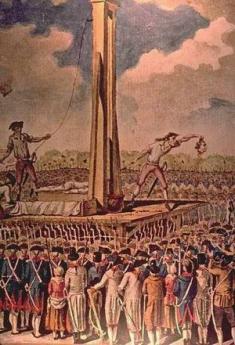
|
| Terror, the Guillotine, |
It is not surprising that Diderot rejected the Leibniz view of things that "All is for the best, in this best of all possible worlds." And, in view of his dependence on Catherine, not surprising he did not publish his rejection of it until 1823. Thomas Jefferson was in France as ambassador during the time of the American Constitutional Convention, fearing to confront George Washington; and likewise keeping his conflicting views private for several years. Eventually, they surfaced in the creation of an anti-Federalist political party along with the conflicts which kept the new nation in a turmoil for the following forty years. It is surely a testimony to the strength of the Constitution's design that the country was able to shift between such extreme governing philosophies but still hold together without changing the governing statement of purpose. Indeed, it is plausible to contend that our two political parties still continuously debate the useful tension between these two differing opinions.
Penman of the Constitution
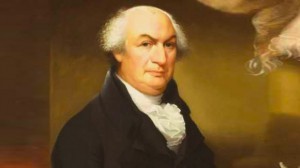
|
| Gouverneur Morris |
THE Constitution is the product of many minds, its ideas have many sources. But final phrasing of the unified document can largely be traced to a lawyer, Gouverneur Morris. The Constitutional Convention would announce a topic, argue for days about different resolutions of it, and then vote on or amend a composite resolution ( unless the matter was deferred to another day of earnest wrangling.) After months of deliberation, that jumble of resolutions made quite a pile. The Convention then turned it all over to Gouverneur Morris for smooth editing and uniformity. Although Morris had arrived a month late for the Convention, he still had time to rise and speak his views more than any other delegate, 173 times. But comparatively few of his ideas identifiably survived the voting; by Convention's end, the delegates were most likely listening for elegance and poise, increasingly expecting the final edit to be his. He finished the task in four days, and the full convention only changed a few words before accepting it. This assembly needed a lawyer who would sincerely follow the intent of his client, rather than yield to the slightest temptation to warp it with his own views. The convention had heard his opinion about almost everything, were thus alerted to uninvited slants. He gave them what they asked for, wording it for persuading the nation, as he himself had been persuaded by what the delegates wanted. The remarkable degree to which he had faithfully served his client's wishes, rather than his own, only emerged twenty years later. During the War of 1812, he disavowed the Constitution he had written.
 We the People of the United States, in Order to form a more perfect Union, establish Justice, insure domestic Tranquility, provide for the common defence, promote the general Welfare, and secure the Blessings of Liberty to ourselves and our Posterity, do ordain and establish this Constitution for the United States of America. 
|
| Preamble to the Constitution |
Morris mostly shortened what the delegates had said. A word here, a phrase there, sometimes whole sentences were removed. After that, rearrangement, and substitution of more precise verbs. This lion of the drawing room, this duelist of the salon, undoubtedly had an enjoyable time twitting his less accomplished clients with brisk capsules of what, of course, they had meant to say. To remember that he was outshining Benjamin Franklin and most of the other recognized wits of the continent, is to savor the fun of it all. Of all people in the Enlightenment, Franklin was certainly Gouverneur's equal in sparkling exchanges of debate. Here, he did not even try.

|
| John Peter Zenger |
Where did this apparition come from? He was almost but not quite a lord of the manor, referring to his extensive riverfront estate in the Bronx called Morrisania, which dated back seven generations in America and ultimately belonged to him, but the title went to his half-brother. He was unquestionably a member of that small society which settled America before the English colonization. Even George Washington was only a fourth-generation American. The Morris side of the family had included two Royal Governors of New York, including the one who tried to imprison Peter Zenger for telling the truth. Gouverneur was his mother's family name, one of the Huguenots who settled New Rochelle in 1663. Under the circumstances, it is not surprising that his mother was a loyalist, and his half-brother a Lieutenant General in the British Army. Gouverneur Morris was a brilliant student of law, unusually tall and handsome for the era. He was as tall as George Washington, and Houdon used him as a body model for a statue of the General. Among the ladies, he created a sensation wherever he went. At an early age, however, he spilled a kettle of hot water on his right arm, which killed the nerve and mummified the flesh. The pain must have been severe, with not even an aspirin to help, and the physical deformity put an end to a big man's dreams of military valor. To a young mind, the physical deformity probably seemed more disfiguring than it needed to be, in addition to diminishing his own ideas of himself. He turned to the law, where he was probably a fiercer litigant than he needed to be. And more of a rebel.
The timing of circumstances drove him out of Morrisania, then out of Manhattan, as the invading British cleared the way for the occupation of New York City. Then up the Hudson River to Kingston, and on to the scene of the Battle of Saratoga. He had been elected to the Continental Congress but stayed in the battlegrounds of New York during the early part of the Revolution, helping to run the rebel government there, and making acquaintance with George Washington, whom he soon began to worship as the ideal aristocrat in a war he could not actively join as a combatant himself. With Saratoga completely changing the military outlook for the rebellion, Morris was charged up, ready to assume his duties as a member of the Continental Congress. By that time, Congress had retreated to York, Pennsylvania, George Washington was in Valley Forge, and the hope was to regroup and drive the British from Philadelphia. For all intents and purposes Robert Morris the Philadelphia merchant, no relative of Gouverneur, was running the rebel government from his country home in Manheim, a suburb of Lancaster. After presenting himself to Robert, Gouverneur was given the assignment of visiting the camps at Valley Forge and reporting what to do about the deplorable condition of the Army and its encampment. By that time, both the British and the French had about decided that the war was going to be decided in Europe on European battlefields, so the armies and armadas in America were probably in the wrong place for decisive action. Lord North had reason to be disappointed in Burgoyne's performance at Saratoga, and Howe's abandonment of orders, even though by a close call he had captured the American Capital of Philadelphia. Consequently, Lord North added the appearance of still another defeat by withdrawing from Philadelphia, deciding in the process to dispatch the Earl of Carlisle to offer generous peace terms to the colonies. Carlisle showed up in Philadelphia and was more or less lost to sight among rich borderline loyalists of Society Hill like the Powels. His offer to allow the Americans to have their own parliament within a commonwealth nominally headed by the Monarch went nowhere. The Colonist Revolutionaries were being offered what they had asked for, in the form of taxation with representation. To have it more or less snubbed by the colonists was certainly a public relations defeat to be added to losing Philadelphia and Saratoga. In this confused and misleading set of circumstances, Gouverneur sent several official rejections of the diplomatic overture and wrote a series of contemptuous newspaper articles denouncing the idea. It seems inconceivable that Gouverneur would take this on without the approval of Washington, Robert Morris, or the Continental Congress, to all of whom he had ready access. But if anyone could do such a thing on his own responsibility, it was Morris. One hopes that future historians will apply serious effort to clarifying these otherwise unexplainable actions.
With of course the indispensable help of retrospect, some would say Gouverneur Morris had committed a massive blunder. The Revolutionary War went on for six more years, the Southern half of the colonies were devastated, and the post-war chaos came very near destroying the starving little rebellion. The alternative of accepting the peace offering might have allowed America and Canada to become the world powers they did become; but the French Revolution or at least the Napoleonic Wars might never have happened, the World Wars of the Twentieth century might have turned out entirely differently, and on and on. Historians consider hypothetical versions of history to be unseemly daydreams ("counterfactuals"), but it seems safe to suppose Gouverneur Morris changed history appreciably in 1778. Whether he did so as someone's agent, or on his own, possibly remains to be discovered in the trunks of letters of the time. Whether the deceptive atmosphere of impending Colonial victory was strong enough to justify such wrongheaded decisions, is the sort of thing which is forever debatable.
While most of the credit for the style of the Constitution must go to Gouverneur Morris, there is a record of a significant argument which Madison resisted and lost, about the document style. During the debates about the Bill of Rights, Roger Sherman of Connecticut rose to object to Madison's intention to revise the Constitution to reflect the sense of the amendments, deleting the language of the original, and inserting what purports to be the sense of the amended version. That is definitely the common practice today for organization by-laws and revisions of statutes; it is less certain whether it was common practice at the end of the 18th Century. In any event, Sherman was violently opposed to doing it that way with amendments to the Constitution. After putting up a fight, Madison eventually gave up the argument. So the 1789 document continues to exist in its original form, and the fineness of Morris' elegant language is permanently on display. It may even help the Supreme Court in its sometimes convoluted interpreting the original intent of the framers. In any event, we now substitute the unspoken process of amending the Constitution by Supreme Court decision, about a hundred times every year. By preserving the original language, the citizens have preserved their own ability to have an opinion about how it may have wandered.
REFERENCES
| Gentleman Revolutionary: Gouverneur Morris, the Rake Who Wrote the Constitution : Richard Brookhiser: ISBN-13: 978-0743256025 | Amazon |
A Time to Read Books

|
| Retirement Reading |
BEFORE we talk about retirees reading books in a retirement community, reflect for a moment about reading in your own home during the working years. Most suburban homes do not have many books in evidence. It's possible to stand in the center of most suburban living rooms unable to see a single book, while it's hard not to see a television set. Increasingly, a home computer is only a few steps from the front door, but the evolution from desktop to laptop to portable telephone to tablet is too rapid to make generalizations. Everyone says books are going to disappear soon, and newspapers maybe even sooner. But there are still said to be a million books constantly in transit on 18-wheeler trucks between print shops and wholesale depositories, night and day. Right now, the producers, publishers and merchandizers of printed material are in turmoil and decline, so they talk about it a lot. But ultimately it is the reading public which will decide what it wants and force the suppliers to give it to them.

|
| reading |
It seems to me that what the reading public wants most is to find time to read. The suburban home has so few books because the sort of person who lives in the suburbs to be near the school system, just doesn't have time to read after the day's work and commuting. Helicopter parents spend a lot of time hauling the kids to mandatory kid entertainments, as can easily be seen by driving past a high school in the afternoon and observing the lines of cars with waiting mothers. They make the best of it as a social occasion for mothers with shiny cars, but they really do it to be sure the kids don't get mixed up with recreational drugs. Anyway, they do it, and it all eats up their discretionary time for reading. Meanwhile, their's no local bookstore to buy books, even unread books. They may think they will catch up on their reading after they retire, but that's becoming increasingly unlikely in my observation. They are getting out of the habit of reading. By the time they retire, they will find it's almost like going back to school. You must find other readers, readers groups, conversations about books over the bridge table, books lying about. The first economy a struggling news paper makes is to cut down the size and number of book reviews, because there are no bookstores to take out advertising, and advertising is what pays for newspapers. There's one good feature about that; what book chatter there is, is not so confined to recent books. Some people are bookish and other people are golf-ish, and a growing number of people are simply TV-ish. It's a struggle to find time for work and the family, and books on top of that. No matter what level of reading the working people may be doing, it's declining in favor of deferred reading when they finally retire.

|
| Retirement Community |
Having visited quite a number of retirement communities, I find the community's library is a good place to assess the institution and its typical inhabitant. When it's newly built, a library area is set aside, usually without many books. The first few waves of residents quickly fill up the space with books they brought from home. During the first ten years it is possible to guess what sort of person lives there by the books they brought and deposited, or died and left to the library. The space, more or less empty at first, gets full and something must be discarded. Enlarging the library is an economic issue, so the size at which it halts will to considerable degree reflect the willingness equilibrium to pay for new construction, both by the book lovers, and by the book enemies, the golfers and the administrators. Ultimately book congestion gets to the point where someone simply must cull out some old books to make room for the new. In another essay I have described the use of volunteers to exchange books of no lasting interest for more books of real interest to real residents, through a used-book exchange. But someone must organize the process, often recruited by an administrator who has learned to be horrified of construction which cannot be rented, but must be cleaned and cared for. If passive resistance is a new term to you, this is the place to learn about it. The residents have short memories, lack drive and follow-through. So inertia tends to win, and lack of reading feeds on itself because there is nothing to read. What's apparently needed here is an organization of bookish people that extends to all retirement communities, probably with a paid staff, an annual meeting, Internet connections. And therefore an immortality which can outlive and outlast the passive resistance. Good ideas then have a means to spread and help support other good ideas; somehow the costs must be supported until a few True Believers in Books can write a bequest in their wills to sustain it. And activate their intention, so to speak.
One of the largely unrecognized reasons for the success of the American Revolution was that the Colonies had a higher level of literacy than the Mother Countries. Thomas Paine, for example, printed 150,000 copies of Common Sense on the rickety old printing presses of the 18th century, when there were fewer than three million white inhabitants of the thirteen colonies. And who was mainly responsible for that? It was Benjamin Franklin with his invention and popularization of the lending library. If Ben could find time to start libraries in 1742, and Andrew Carnegie was later found willing to pay for dozens of them, surely the time and energy can be marshaled in the 21st century to establish a first-class library system throughout the retirement communities of the nation.
Void for Vagueness

|
| Question Mark |
BECAUSE otherwise, everyone would plead ignorance, ignorance of the law has been dismissed as a defense for thousands of years. What, then, is the situation when the statute itself is accused? Here, a group of citizens accuses the government of enacting vague laws, conceivably with the malicious intent to give government officers a free hand. Only the U.S. Supreme Court may decide Constitutional issues, and nine Justices are certainly inadequate to cope with a huge vagueness project. The Court must at least define a method for coping with imprecision. What is to be done with this?
 Is it really any longer true that ignorance of the law is no excuse? 
|
This novel proposition is a recent one, mostly because the volume of laws has steadily grown since 1787, when we began the Republic without any statutes at all, to the present gargantuan size of the Federal, State and Local Codes requiring hundreds of feet of shelf space in a library. No human brain can contain all that information at once, not even to mention the interpretive Regulations which grow by hundreds of thousands of pages each year. The limits of practical governance by traditional methods have passed the point where ignorance of the law is a theory, it is an absolute certainty for every citizen in most situations. Is it thus really any longer true that ignorance of the law is no excuse? Perhaps modern computer search capability has advanced to the point where it can conquer this problem for judges in an appellate situation, but woe unto the financier or automobile driver who professes ignorance of the state of judicial dispute resting in the system. Sometime relatively soon, some legal genius must figure out a sensible, workable, way to reconsider the rule that ignorance is no excuse when plainly anything other than ignorance is a laughable pretense.
But this muddle is only a background for a new twist to the same issue. The synthetic process has now created a growing apprehension that duly elected officials have passed laws which are deliberately vague, forcing the country to surrender decisions to a tyrannical process. Leave motive and intent out of the discussion; a tyrant is being created whether a tyrant seeks the crown or not. Just review recent history.

|
| Lame Duck |
We now grow accustomed to seeing proposed legislation thousands of pages long, appearing on the desks of elected congressmen who have been given a day or two, or sometimes less than a day, to approve them. The authors of this proposed legislation are often quite unidentifiable, and might sometimes not even be officials of the government. For a while, there was some talk of appointing "Czars" for certain areas of activity, but this has apparently provoked too much Congressional resistance. These multi-thousand page bills appear out of nowhere in particular, nominally authorized by the Speaker, the Committee Chairman, or some other official of Congress whose freedom of action is actually tightly controlled by arcane but irresistible partisan politics. A legislative body pretending that every member is the equal of every other, is in fact ruled with an iron hand.
Elected representatives of the people, charged with writing our laws, who even happen to belong to the majority political party, are powerless to refuse to adopt the legislation they have not read, and the minority is even more dismissively ignored. Confounding even careful reading of small sections of these bills, they are vague, potentially intentionally so. There is scant opportunity afforded legislators to question the authors of these legislative piles, not even the opportunity to have them reveal their names. Subscribe to this mystery package, or suffer unspoken political punishments. We are told assurances are privately given there will be an opportunity to correct errors when regulations are written by the Executive branch. The Legislative branch effectively removed itself from the expenditure of a trillion dollars for a medical reform that no one could lucidly explain, affecting a sixth of the gross domestic product. Within a month, this "reform" was followed by a highly similar process directed at the financial system of the nation, which likewise bears almost no resemblance to the problems it claims prompted the action. Small wonder the countryside is dotted with Tea Parties, and small wonder they are confused by what they want. Chief among their objectives is a demand to return to an understandable system, controlled by the legislative branch, not the executive one.
Whether the applicable term is "vagueness" or whether an underlying motive is to be alleged by calling it "deliberate ambiguity", a former Justice of the U.S. Supreme Court once supplied an adequate slogan for these legal barricades. Justice George Sutherland, who sat on the court from 1922 to 1938, constructed the legal standard for the unconstitutionality of criminal cases called Void for Vagueness . It seems a sufficiently evocative slogan for fall election campaigns, and it might even serve as a legal claim in a Supreme Court test of the matter.
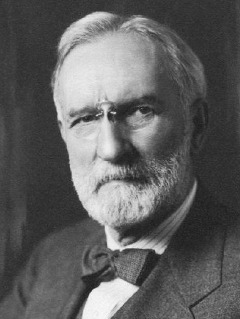
|
Meanwhile, we have wars to fight, and the deepest recession in eighty years, plus whatever events national or international news may force us to contend with. A monumental Supreme Court test seems an almost welcome alternative. To make it possible, the Court will have to resolve the difficulty that this issue is neither criminal nor civil in the usual sense, and there is no third alternative. Furthermore, there is the picky-picky quibble that the doctrine of "void for vagueness" has only previously been used in criminal cases. We will have to endure the Republican resurrection of George Sutherland as a former American Bar President, whose elevation to the Supreme Court was so anticipated by everyone that he was unanimously confirmed, without hearings, the day he was nominated.
The fact is, popping the bubble of "void for vagueness" in this particular political tap dance is only an early warning that the nation is already inundated in a sea of bewildering rules. To the point where ignorance of the law must be acknowledged to be the common fate of all citizens. The law must soon address the matter, uncharacteristically remembering that the first step in resolving any true crisis is to decide which rule must be broken.
Bones in Duffy's Cut
THE Right Angle Club was recently honored by a talk by Professor William Watson, who teaches history at Immaculata University in Malvern, Pennsylvania. Although it is hard to find much memorial recognition of it, Immaculata is on the site of the Battle of the Clouds, of the Revolutionary War. Washington's army was retreating from the advancing British invaders from Elkton, Maryland, who were headed for the occupation of Philadelphia, in 1778. Although Washington had been outflanked at the biggest battle of the war at Brandywine Creek, he regrouped near Paoli and prepared to defend Philadelphia where the Continental Congress convened. A tremendous rainstorm, possibly a hurricane, hit the two armies as they formed for battle, and everyone's gunpowder was soaking wet. By mutual consent, the battle was called off. The Malvern area was also the site of the Paoli massacre, where General Anthony Wayne overestimated his understanding of the local area, and British troops attacked at night with orders to use bayonets, only.

|
| Duffy's Cut |
Professor Watson was, however, speaking about another massacre in the area, at Duffy's Cut. The Cut now belongs to Amtrak, but it was originally built in 1832, from Columbia on the Susquehanna River eastward, as the Philadelphia and Columbia RR, using horse-drawn rail carriages. That essentially means it went from Scotch-Irish Cumberland County, through the Pennsylvania Dutch territory, to Quaker Chester County and Federalist Episcopalian Philadelphia. The builders of the railroad contracted out mile-long sections of the construction to contractors, one of whom was Philip Duffy, who naturally imported southern Irish laborers to do the digging. As a sidelight, Duffy lived in Port Richmond, where he was buried, allegedly a very rich man. His work site was nearly 60 miles east of Columbia, the most expensive contract on the railroad because it involved more cutting and filling of the hilly countryside: Duffy's Cut.
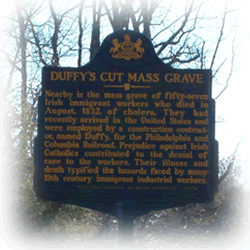
|
| Duffy's Cut Marker |
Sanitary conditions at the dig site were probably pretty primitive, ideal for the spread of fecal-borne illnesses like cholera (and hepatitis, amoebic dysentery, Salmonella, and Shigella), which are characteristic of concentration camps, prison camps, army encampments, and the like. Many later epidemiologists now trace the introduction of cholera to Canada, with downward spread along the Susquehanna, but fifty years before Pasteur there was no sure way to make the diagnosis and no knowledge of its epidemiology. The Irish encampment at Duffy's Cut might just as well have died of bacillary dysentery, but it would have made little difference to know; they just died, and it was said to be cholera that did it. It was probably some kind of fecal contagion, but modern archaeology has recovered eight or ten skulls with bullet holes at the site, and historical investigation of the more usual type has recovered letters by President Clement of the Pennsylvania Railroad, ordering a cover-up. The rest of the story is necessarily conjectural, and we have to be uncertain whether Clement was concerned about hushing up cholera in the region, or ethnic riots, and if so whether he wanted to avoid scaring away replacement laborers, or avoid stirring up local antagonisms. Professor Watson describes considerable difficulty with getting cooperation from politicians and news media in pursuing his studies, where it is hard to see any non-railroad motive, except the motive of wanting to let sleeping dogs lie.
If so, it is a serious concern. It must be recalled that the Scotch-Irish of central Pennsylvania were located there as a result of the activities of James Logan, the agent of the Penn family. The Penns wanted to sell land to settlers and felt that fear of hostile Indians was inhibiting immigration. Logan, who was himself a Scot from Northern Ireland, suggested that the protestant Scotch Irish of that region were tired of combating their Catholic neighbors to the south, and were definitely the equal of the Indians in combativeness. This is the reason the Scotch Irish of Pennsylvania were located to the west of the German settlements of Dauphin and Lancaster Counties. It is also the cause of numerous clashes with the Indians (the Paxtang Boys), the Connecticut invaders of the three Pennamite Wars, and most notably -- the Irish Catholic Molly Maguires of the Pottsville region. Throughout all of these overtly military disputes ran the readily observable fact that the Scottish tribes were accustomed to guerrilla warfare in the woods. They mainly are responsible for winning the Revolutionary War, at least in the Appalachian regions stretching as far to the south as Georgia. They leave us a heritage of bagpipes, country music, very rough football, and airplane pilots. Unfortunately, rough behavior provokes rough behavior in return, and much of the unfortunate features of the labor conflicts of our national politics can be traced to the scars and antagonisms of the Molly Maguire episode of railroads and coal mining. This may or may not have been on Clement's mind when he tried to suppress the news of Duffy's Cut massacre, but it should have been, and to some extent it probably was.
There is no excuse for shooting people in the head or killing them with an ax. But the sixth or seventh generation descendants of the victims are urged to reflect that a campful of male laborers far away from home are apt to exhibit unfortunate behaviors. Remember that no one knew the cause of cholera, but it was new, and it certainly looked contagious. The laborers may or may not have brought it with them, but somebody introduced it to the region, and it looked as though the contagion would continue to spread as long as the laborers continued to be there. There might well have been some unfortunate economic incentives at work, like the disappearance of the Conestoga wagon industry among the Pennsylvania Dutch when the railroad came through. And the obvious concern of the railroad owners that the region has a peaceful, healthful, reputation. The almost total approval of slavery by the Pennsylvania Irish during the Civil War provoked Lincoln to send ten thousand troops to the area during the Civil War. And on, and on. There is almost no part of this region which does not have some remote history of savage behavior. Let's be careful not to stir it up.
Ruminations About the Children's Education Fund (3)
The Right Angle Club runs a weekly lottery, giving the profits to the Children's Educational Fund. The CEF awards scholarships by lottery to poor kids in the City schools. That's quite counter-intuitive because ordinarily most scholarships are given to the best students among the financially needy. Or to the neediest among the top applicants. Either way, the best students are selected; this one does it by lottery among poor kids. The director of the project visits the Right Angle Club every year or so, to tell us how things are working out. This is what we learned, this year.
The usual system of giving scholarships to the best students has been criticized as social Darwinism, skimming off the cream of the crop and forcing the teachers of the rest to confront a selected group of problem children. According to this theory, good schools get better results because they start with brighter kids. Carried to the extreme, this view of things leads to maintaining that the kids who can get into Harvard, are exactly the ones who don't need Harvard in the first place. Indeed, several recent teen-age billionaires in the computer software industry, who voluntarily dropped out of Harvard seem to illustrate this contention. Since Benjamin Franklin never went past the second grade in school perhaps he, too, somehow illustrates the uselessness of education for gifted children. Bright kids don't need good schools or some such conclusion. Since dumb ones can't make any use of good schools, perhaps we just need cheaper ones. Or some such convoluted reasoning, leading to preposterous conclusions. Giving scholarships by lottery, therefore, ought to contribute something to educational discussions and this, our favorite lottery, has been around long enough for tentative conclusions.

|
Just what improving schools means in practical terms, does not yet emerge from the experience. Some could say we ought to fire the worst teachers, others could say we ought to raise salary levels to attract better ones. Most people would agree there is some level of mixture between good students and bad ones. At that point, the culture mix becomes harmful rather than overall helpful; whether just one obstreperous bully is enough to disrupt a whole class or something like 25% of well-disciplined ones would be enough to restore order in the classroom, has not been quantitatively tested. What seems indisputable is that the kids and their parents do accurately recognize something desirable to be present in certain schools but not others; their choice is wiser than the non-choice imposed by assigning students to neighborhood schools. Maybe it's better teachers, but that has not been proved.

|
It seems a pity not to learn everything we can from a large, random experiment such as this. No doubt every charity has a struggle just with its main mission, without adding new tasks not originally contemplated. However, it would seem inevitable for the data to show differences in success among types of schools, and among types of students. Combining these two varieties in large enough quantity, ought to show that certain types of schools bring out superior results in certain types of students. Providing the families of students with specific information then ought to result in still greater improvement in the selection of schools by the students. No doubt the student gossip channels already take some informal advantage of such observations. Providing school administrations with such information also ought to provoke conscious improvements in the schools, leading to a virtuous circle. Done clumsily, revised standards for teachers could lead to strikes by the teacher unions. Significant progress cannot be made without the cooperation of the schools, and encouragement of public opinion. After all, one thing we really learned is that offering a wider choice of schools to student applicants leads to better outcomes. What we have yet to learn, is how far you can go with this idea. But for heaven's sake, let's hurry and find out.
Barnes Foundation -- Drawing a New Moral

|
| Andrew Stewart |
Andrew Stewart, the Public Relations Director of the Barnes Foundation, and for thirteen years a member of its Board of Directors, recently addressed the Right Angle Club. He gave a new slant to the quarrelsome saga of Dr. Barnes' will, offering the point of view in favor of moving the paintings to the Parkway. It's useful to hear the legal and historical background because about all we hear are criticisms, balanced by joy at having the famous paintings where we can see them.
Essentially, the will declared a wish for the School and Museum to follow the original indenture. After the passage of time, the old board members died off, and the new board members found the Indenture to be out of date, like specifying the purchase of railroad bonds. Delivered in a charming Scottish brogue, the argument was fairly convincing. But it stimulated in me an entirely different moral from the eternal dispute between the right of a man to have respect paid to his expressed wishes for his own property, versus the self-defeating quality of the same restrictions with the passage of time.
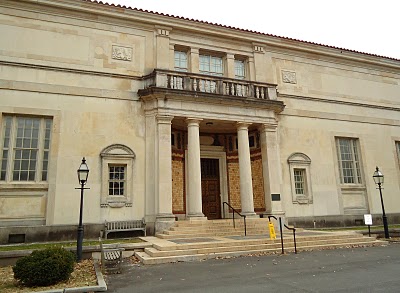
|
| Barnes Foundation |
Barnes was born in Kensington, and had a hard life as the son of a Civil War veteran who lost an arm in the war, and had a dismal time making a living as a butcher. Barnes was his fighting-spirit son, who worked his way through medical school. It was Jefferson Medical College, where I was on the faculty for decades. While it is true his patent medicine gave a permanently sickening color to the children who were treated for sinusitis, it is also true that in the form of eyedrops it prevented the transmission of syphilis to millions of newborn children. In that view, it was a real scientific contribution, although the medical profession continues to take a dim view of doctors advertising their wares. Although he was himself a failed artist, Barnes was a highly successful collector of (then) modern art and started a school with John Dewey to teach art appreciation to poor people. One by one, the local universities snubbed his wishes for an art appreciation school, and the local Philadelphia museums were pretty sniffy about his favorite artists.
In fairness to them, Barnes was probably pretty pushy in his demands. Unfavorable local reception to an exhibition which had received rave applause in Paris, convinced Barnes he was right and they were wrong. After this, Barnes developed a lasting hatred of Philadelphia and all its stuffy ways; he definitely didn't want his own impressionist art to be in Philadelphia, which would never appreciate it. While Philadelphia finally woke up to the value of Impressionist painting, Barnes never relented while he was alive. I hope I give a fair portrayal of the argument except for the politics and the legalities, that I know very little about.
But hearing the arguments, I see an entirely different moral to the saga. Ever since the inflation of the 1930s, fine art has appreciated in value, faster than the endowments to maintain the art. (That's probably a useful tip to investors, too.) It's fairly standard for a wealthy person to donate his art collection, plus a sum of money to endow the maintenance of the art. Most of the time, the size of the endowment is carefully calculated to grow at least as fast as the value of the paintings, because you have to ensure them, and pay for increased security, and increasing attendance. With the new trend toward inflation of at least 2% a year, the old premises don't work anymore, and the endowment eventually runs out. At that point, it runs into restrictions which -- to be perfectly blunt -- were created to prevent the trustees from pilfering the museum. A museum may not sell its art to pay for administrative expenses.
Consequently, The Barnes ran into a situation where it had billions of dollars worth of paintings in the basement, which it could not sell, and could not even hang in the museum because of Barnes' specifications for what went on the walls. This situation isn't going to change, because a dollar in 1913, when the Federal Reserve was created, is now scarcely worth more than a penny. And the present Fed is committed to 2% inflation, forever.
So, how about this: let the lawyers who write wills, and the Orphan's Court which administers them, insist that the art collection be divided into two parts. One would be the permanent collection, just as at present, and the other would be eligible for sale in the judgment of the Orphan's Court.
The Accounting of Natural Capital

|
| Libby_Bernick |
Libby Beineck, the vice president of a British firm called Trucost, recently visited the Right Angle Club to explain how corporate accounting might be changed to adjust for any external costs to the environment. She is of Quaker ancestry, descended from Samuel Rhoads, the architect of the Pennsylvania Hospital, so the group was immediately congenial. Her company presently values the environment as having a capital value of $7.3 trillion and helps companies calculate how they are adding to, or subtracting from, the world's natural capital.
The club responded well to her message, proceeding to ask a number of friendly questions, a process which accelerated as the questions received thoughtful answers. We are, indeed, using up our heritage of environmental capital, and have led the developing world to imitate us. The thought has to occur that perhaps this sort of consumption is a stage of development, inevitably followed by a strong movement to reverse the damage. They used to keep the streetlights of Pittsburgh lit during the daytime, washed their curtains every week, and never painted a house white if they knew what was good for them. But all this was reversed in just a few years when Richard King Mellon decided he was tired of it and made it stop. Unfortunately, the net capital value of Pittsburgh has probably declined further, because people valued the steel industry less than the environment.
One member of the audience took a far longer view. It was probably Isaac Newton who declared that matter is neither created nor destroyed, it only changes its form. What we refer to as the natural environment was caused by volcanic eruptions and the impact of asteroids. Ultimately, the environment only lasts for the duration of the interval between meteorites and volcanos, and predicting the total dissolution of the environment by the next shift of tectonic plates, is anybody's guess. Ultimately, we are at the mercy of the extrapolation fallacy in all of this. We dare not predict that the next asteroid will hit us after the last one, with the same interval between them. We dare not predict that cheap oil will run out at present rates, or that shale gas will take its place in a completely fortuitous way. If you look at the ocean, there seems to be plenty of water needs have its salt removed, plenty of sunlight from the sun for eons to come, plenty of energy fused into the molecules of the earth. What you can't extrapolate very well at all, is how fast our scientists will find a way to release this limitless supply of energy so we can use it. Some people have more faith in our scientists than others do, so it seems best to conserve what we have. Or rather, to use it up as slowly as we can.
39 Blogs
Constitution-tampering is Unwise
Working paper: The voluntary union of sovereign states is so rare as to stand unique if successful. Since the secret of the U.S. Constitution seems to be its delicate internal balance, tampering with its provisions is to be resisted. That's not strict constructionism, it's fear of disturbing successful equilibrium.
What Do Unions Want?
Working topic: Much of American history of the 20th Century fits the theory that the auto and steel unions realized the fringe benefit revolution was a product of World War II and would not last. Their strategy seems to have been to fight desperately to preserve fringe benefits, while simultaneously working politically to get the tax payers to relieve heavy industry employers of the cost.
Looking Beyond Cheap Oil
Working topic: There's plenty of world oil for centuries to come, but cheap oil is mainly found in the Middle East. Even expensive oil would be cheap after a huge investment in transportation, pre-processing and refining. The geopolitical strategy would be to bite this bullet for American consumption while forcing peace on the rest of the world by its continued dependence on the Middle East. The logical outcome of this thinking is to establish permanent Middle East military bases.
Rising (China and) Developing Nations
Working topic: Sudden prosperity leaps ahead of rising lifestyles: developing countries have an early period where they cannot spend their money on consumer goods. These abnormally large savings increasingly penetrate and destabilize globalized markets. The world needs a better banking arrangement, and may well need a new basis for currency reserves.
Philadelphia City-County Consolidation of 1854
 Prior to 1854, Philadelphia City was one of twenty-nine political entities within Philadelphia County. After that, it became one big city without suburbs. Growth pressure now reverses toward suburbs without a city. Political boundaries should thus shift inwardly.
Prior to 1854, Philadelphia City was one of twenty-nine political entities within Philadelphia County. After that, it became one big city without suburbs. Growth pressure now reverses toward suburbs without a city. Political boundaries should thus shift inwardly.
Second Mortgages Want to Be First
 Banks would not normally take sides between first and second mortgages. However, securitization took the first mortgages away from big banks, so they now have an incentive to seek political favor for second mortgages.
Banks would not normally take sides between first and second mortgages. However, securitization took the first mortgages away from big banks, so they now have an incentive to seek political favor for second mortgages.
Special Education, Special Problems
 Until recently, mentally retarded children weren't even considered in school budgets. But in recent decades, they have become one of the biggest challenges.
Until recently, mentally retarded children weren't even considered in school budgets. But in recent decades, they have become one of the biggest challenges.
Taking Risks Demands Its Price
 For a few days in August 2007, no one knew why financial markets were suddenly in a jumble. After a week it became clear, risk spreads had been too narrow and were reverting to normal. It would be painful.
For a few days in August 2007, no one knew why financial markets were suddenly in a jumble. After a week it became clear, risk spreads had been too narrow and were reverting to normal. It would be painful.
George Washington Demands a Better Constitution
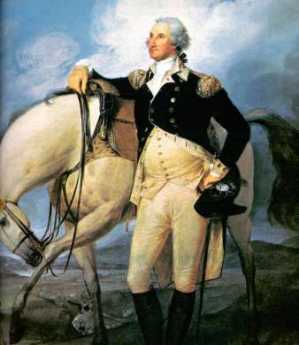 George Washington was an athlete, a soldier, and an adventurous leader. It is less appreciated that he constructed that aloof public image of himself, cloaking an activist politician and rather ambitious real estate developer. We got a new Constitution because he wanted a new constitution.
George Washington was an athlete, a soldier, and an adventurous leader. It is less appreciated that he constructed that aloof public image of himself, cloaking an activist politician and rather ambitious real estate developer. We got a new Constitution because he wanted a new constitution.
Obamacare Follies, Executive Summary
In abbreviated form, health care reform as of September, 2009. Expanded explanations follow.
The King's Last and Final Word
 King Charles II did give Wilkes-Barre to Connecticut first, and the same king did later give the same land to William Penn. Unfortunately for Connecticut, at that time the last word was all that mattered.
King Charles II did give Wilkes-Barre to Connecticut first, and the same king did later give the same land to William Penn. Unfortunately for Connecticut, at that time the last word was all that mattered.
Albert Gallatin: Enigma Furioso
 A man in constant motion for 88 years, Albert Gallatin almost defies description. America's longest-serving Secretary of the Treasury also founded New York University and the Chase National Bank and negotiated the Treaty of Ghent. Having led the charge in denouncing Hamilton's bank, his greatest achievement was to persuade Jefferson not to close it down.
A man in constant motion for 88 years, Albert Gallatin almost defies description. America's longest-serving Secretary of the Treasury also founded New York University and the Chase National Bank and negotiated the Treaty of Ghent. Having led the charge in denouncing Hamilton's bank, his greatest achievement was to persuade Jefferson not to close it down.
Cost of K-12 Education
 The Philadelphia Inquirer just published the average school expenditures, per district, in our region of 166 districts within 8 counties. The City of Philadelphia comes in dead last, at $11,460 per pupil.
The Philadelphia Inquirer just published the average school expenditures, per district, in our region of 166 districts within 8 counties. The City of Philadelphia comes in dead last, at $11,460 per pupil.
Pea Patch Island
 A string of three forts at the level of the Delaware-Chesapeake Canal once guarded the approaches to Philadelphia but were never needed. After the Battle of Gettysburg, Fort Delaware on Pea Patch Island served as a deplorable prison camp for Confederate prisoners; it's now a tourist stop.
A string of three forts at the level of the Delaware-Chesapeake Canal once guarded the approaches to Philadelphia but were never needed. After the Battle of Gettysburg, Fort Delaware on Pea Patch Island served as a deplorable prison camp for Confederate prisoners; it's now a tourist stop.
The No-Doctrine Doctrine
 The doctrine of Quakerism is to have no doctrine. It has provoked two main schisms in the church; George Keith making a plea for at least some doctrine, Elias Hicks leading a later move back to simplicity.
The doctrine of Quakerism is to have no doctrine. It has provoked two main schisms in the church; George Keith making a plea for at least some doctrine, Elias Hicks leading a later move back to simplicity.
Children's Scholarship Fund (1)
 The Right Angle Club has decided to make donations to the Children's Scholarship Fund of Philadelphia..
The Right Angle Club has decided to make donations to the Children's Scholarship Fund of Philadelphia..
Tour of Duty in 'Nam
 >Veterans of the Vietnam conflict are famously reluctant to talk about their experiences. It's hard to know what that means, and whether it's a good thing or a bad thing.
>Veterans of the Vietnam conflict are famously reluctant to talk about their experiences. It's hard to know what that means, and whether it's a good thing or a bad thing.
Original Intent and the Miranda Decision
 Right before our eyes, we can watch the Miranda decision migrate away from the original intent.
Right before our eyes, we can watch the Miranda decision migrate away from the original intent.
The Proprietorships of William Penn
 William Penn owned Pennsylvania, New Jersey, and Delaware; as the proprietor, he was the largest private American landowner, ever. Although the Revolutionary War mostly ended that, one of his proprietorships still owns all unclaimed land in southern New Jersey.
William Penn owned Pennsylvania, New Jersey, and Delaware; as the proprietor, he was the largest private American landowner, ever. Although the Revolutionary War mostly ended that, one of his proprietorships still owns all unclaimed land in southern New Jersey.
Addressing The Proprietors' Dilemma
 King Charles II gave Pennsylvania to William Penn on condition he defends the place and fuss with neighboring states about its boundaries. A century later, it proved more than a private citizen could handle.
King Charles II gave Pennsylvania to William Penn on condition he defends the place and fuss with neighboring states about its boundaries. A century later, it proved more than a private citizen could handle.
William Penn, Excellent Lawyer, Terrible Businessman
 William Penn was the central force in the establishment of a religion, Quakerism, certain central features of the legal system, three colonies of America, and many of the central concepts of Constitutional Law. He leaves us over three thousand documents, but it remains very hard to form a picture of what he was like.
William Penn was the central force in the establishment of a religion, Quakerism, certain central features of the legal system, three colonies of America, and many of the central concepts of Constitutional Law. He leaves us over three thousand documents, but it remains very hard to form a picture of what he was like.
Political Parties, Absent and Unmentionable
 Our Constitution is much praised for exquisitely balancing power between the three branches of government. It would even be an achievement to require two centuries to find a way to unbalance them.
Our Constitution is much praised for exquisitely balancing power between the three branches of government. It would even be an achievement to require two centuries to find a way to unbalance them.
Addressing the Flaws of Republics
 We need some local, not national, think tanks. To understand why, it helps to have been elected to something, yourself.
We need some local, not national, think tanks. To understand why, it helps to have been elected to something, yourself.
South Philadelphia: Ideal Intermodality Transportation Site
 Very few places on earth have rail, airport, ocean port, and Interstate Highway exits all crowded in a small place. An ideal location for intermodality connections, twenty minutes travel from the center of a major city.
Very few places on earth have rail, airport, ocean port, and Interstate Highway exits all crowded in a small place. An ideal location for intermodality connections, twenty minutes travel from the center of a major city.
Future Directions for Book Authoring
 Personal computers have already revolutionized book authorship by greatly expanding it, and revolutionized book publishing by drowning it in authorship. What comes next?
Personal computers have already revolutionized book authorship by greatly expanding it, and revolutionized book publishing by drowning it in authorship. What comes next?
Locating Corporate Headquarters
 Every year, millions of dollars are spent by cities to induce corporations to relocate their headquarters. Does it work? Is it a goal worth pursuing?
Every year, millions of dollars are spent by cities to induce corporations to relocate their headquarters. Does it work? Is it a goal worth pursuing?
Lowering the Taxes on Corporations
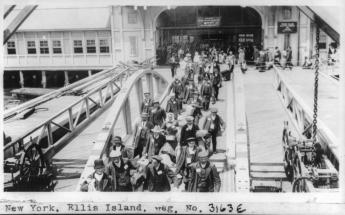 When Ireland lowered corporate taxes, inviting corporate immigration, and then precipitating an international financial crisis, it drew attention from others. Instead of warning them, it encouraged them to imitate Ireland.
When Ireland lowered corporate taxes, inviting corporate immigration, and then precipitating an international financial crisis, it drew attention from others. Instead of warning them, it encouraged them to imitate Ireland.
Adrift With The Living Constitution
.jpg) With apologies to any political tricks left unmentioned.
With apologies to any political tricks left unmentioned.
Nanoparticles: The Dwarfs are Coming
 A lot of basic science will have to be revised when we fully understand what happens to particles after they get small enough.
A lot of basic science will have to be revised when we fully understand what happens to particles after they get small enough.
Children Playing With Matches

Bonds--Do They Have A Future?
 It's increasingly hard to imagine why investors buy bonds because it's increasingly difficult to imagine an end to inflation.
It's increasingly hard to imagine why investors buy bonds because it's increasingly difficult to imagine an end to inflation.
What Is the Purpose of a National Constitution?
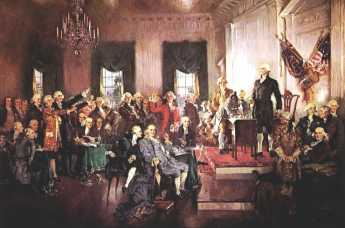 The primary purpose of any Constitution is of course survival. Usually, but not invariably, that means avoiding war with a neighbor which will surely beat you. Having stated what ought to be obvious, the framers of a Constitution need to be careful of the reasons which originally caused the new state to be formed, and also need to avoid provisions which would cause trouble by inciting some different type of governance. These features can be enumerated, but are easily forgotten.
The primary purpose of any Constitution is of course survival. Usually, but not invariably, that means avoiding war with a neighbor which will surely beat you. Having stated what ought to be obvious, the framers of a Constitution need to be careful of the reasons which originally caused the new state to be formed, and also need to avoid provisions which would cause trouble by inciting some different type of governance. These features can be enumerated, but are easily forgotten.
Penman of the Constitution
 The courts have spent a fair amount of time arguing about the meaning of phrases, words and even punctuation in the Constitution. That's what constitutional lawyers think they are paid to do. It seems possible the document survived for centuries, only because its final wording was left to a lawyer who took words seriously, using as few as possible.
The courts have spent a fair amount of time arguing about the meaning of phrases, words and even punctuation in the Constitution. That's what constitutional lawyers think they are paid to do. It seems possible the document survived for centuries, only because its final wording was left to a lawyer who took words seriously, using as few as possible.
A Time to Read Books
 Retirement is a good time to read all those books you meant to read. But certain things stand in the way.
Retirement is a good time to read all those books you meant to read. But certain things stand in the way.
Void for Vagueness
 Ignorance of the law is no excuse, but what about a law that is deliberately vague?
Ignorance of the law is no excuse, but what about a law that is deliberately vague?
Bones in Duffy's Cut
 They are digging up bones in Malvern, finding evidence of murder. Some people are uneasy about perpetuating ethnic strife.
They are digging up bones in Malvern, finding evidence of murder. Some people are uneasy about perpetuating ethnic strife.
Ruminations About the Children's Education Fund (3)
 By selecting children for scholarships by lottery, it emerges that different schools make big differences.
By selecting children for scholarships by lottery, it emerges that different schools make big differences.
Barnes Foundation -- Drawing a New Moral
 Inflation makes for a new slant on the saga of the Barnes Foundation.
Inflation makes for a new slant on the saga of the Barnes Foundation.
The Accounting of Natural Capital
 The vice president of an English firm explains how the external costs to the environment should be part of company accounting.
The vice president of an English firm explains how the external costs to the environment should be part of company accounting.